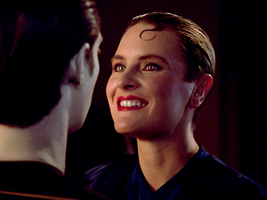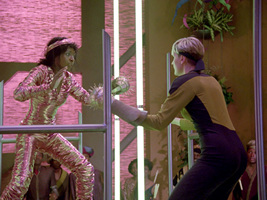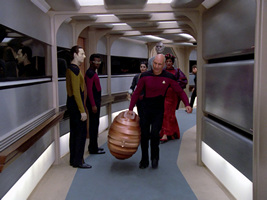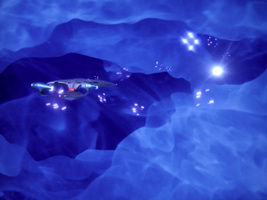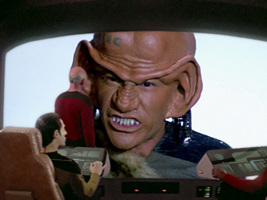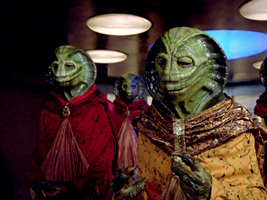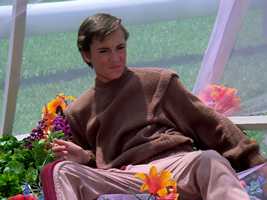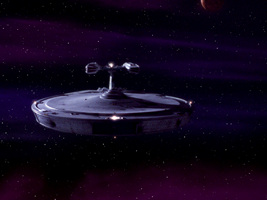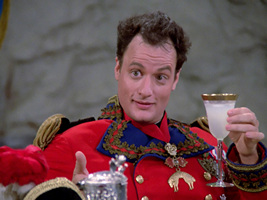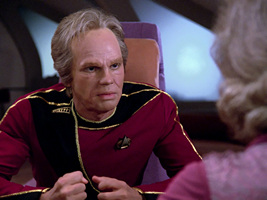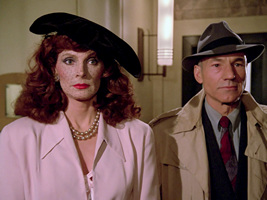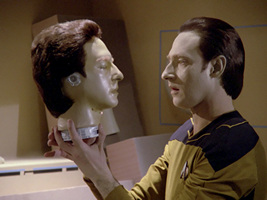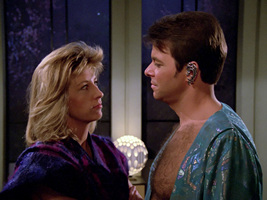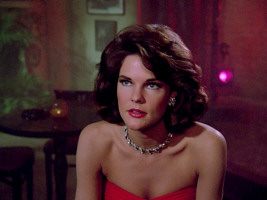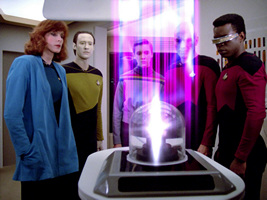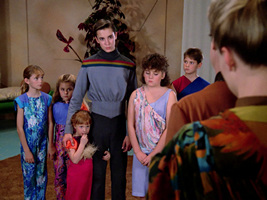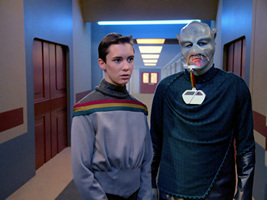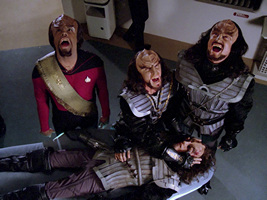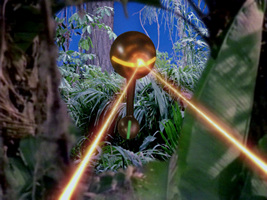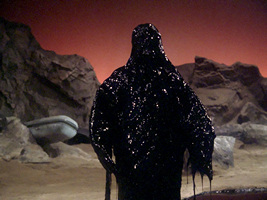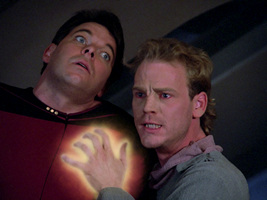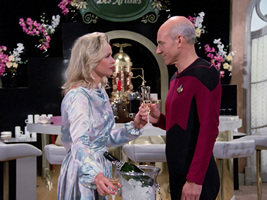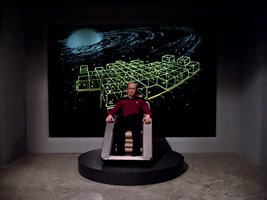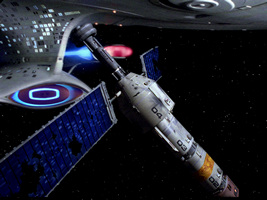The Next Generation (TNG) Season 1 Reviews
Season 1Season 2Season 3Season 4Season 5Season 6Season 7
Encounter at FarpointThe Naked NowCode of HonorHavenWhere No One Has Gone Before
The Last OutpostLonely Among UsJusticeThe BattleHide and QToo Short a SeasonThe Big Goodbye
DataloreAngel One11001001Home SoilWhen the Bough BreaksComing of AgeHeart of Glory
The Arsenal of FreedomSkin of EvilSymbiosisWe'll Always Have ParisConspiracyThe Neutral Zone
Encounter at Farpoint
Synopsis
Stardate 41153.7: The year is 2364. Captain Jean-Luc Picard has just assumed command of the new USS Enterprise NCC-1701-D. En route to Farpoint Station, built by the Bandi on Deneb IV, where the Enterprise is going to pick up new crew members and to investigate mysterious incidents, an immensely powerful being called "Q" inhibits the ship. Q accuses humanity of being an immature species that has to stop exploring the galaxy. Picard orders a saucer separation in order to avert harm to the civilians aboard and then surrenders. He and the battle bridge crew find themselves in an ancient courtroom where Q puts up a trial against humanity. To prove their worthiness, the crew have to solve the "mystery of Farpoint Station". After the ship has arrived at Deneb IV and the investigation has started, an unknown vessel shows up in the planet's orbit, begins to fire on the old Bandi city and kidnaps the Farpoint administrator, Groppler Zorn. An away team beams over to the vessel and discovers that the somehow organic interior is much the same as that of parts of Farpoint Station. It turns out that the Bandi have captured an injured space-dwelling being and coerced it to transform itself into a starbase, and the alien vessel now tries to force the Bandi to release its companion. After the away team has freed Zorn, Picard orders to release the creature on the planet with the help of an energy beam. Q, disappointed that the crew was smarter than he thought, retreats for the time being, while Starfleet provides help to the Bandi to rebuild the station.
Review
When "Encounter at Farpoint" premiered in 1987, 18 years had passed since the last fresh TOS episode was on air. In the meantime there had been the TOS movies with the old crew, but ever since the cancellation of TOS Gene Roddenberry had been pondering about bringing Star Trek back to the small screen one way or another. With TNG he finally accomplished that goal. In many ways TNG wasn't so bold a creation though, as it still relied on a starship named Enterprise with a diverse crew that explored the galaxy. There is not much new in the concept, although TNG definitively profits from general developments such as improved visual effects and stories with multiple plot threads. But in hindsight we should be very glad that the new series was built upon the events of TOS and wasn't conceived as a remake or a reboot, because in the latter cases the valuable Star Trek Universe, as we call the overall uninterrupted continuity today, wouldn't exist. The appearance of DeForest Kelley as the 137-year-old Admiral McCoy is not just a nod to TOS but much like a signal to old-school Star Trek fans that they can feel at home in the new series.
It is a bit odd that the new Star Trek series, set in the 24th century where everything is still more advanced, begins with two major setbacks. The first one is when the Enterprise runs into a superior lifeform that wants to put an end to humanity's exploration of space and would have the power to do it. Picard has no other chance but to surrender and to undergo the extremely unfair trial that Q has set up. The second setback is the finding that Farpoint Station, allegedly built by the inhabitants of Deneb IV, the Bandi, is in reality a living being that is held on the planet against its will. While it is technically a defeat most of all for the Bandi, the Starfleet crew too has to learn a lesson not to trust in everything that they see or that they are being told. At the time it first aired, the time when the peace and the ecology movement was earning acceptance, "Encounter at Farpoint" made a point about not fighting at any cost and about protecting life instead of exploiting it. The "Post Atomic Horror" scenario of 2079 that Picard and Data confirm as authentic is a further concession to the time that TNG was produced, not only because it corroborated the apprehensions of the peace movement, but also because apocalyptic visions of the kind of "Mad Max" were quite fashionable in the late 70s and the 80s.
While the episode unfolds quite nicely (only the directing sometimes feels a bit bumpy), I would have preferred a story in the pilot about a more "ordinary" mission. And I would have preferred had Q been brought in later in the series, then confronting a better introduced crew.
Q has been compared to Trelane of TOS: "The Squire of Gothos" ever since he first showed up. The concept of a self-righteous superior lifeform that plays cruel games with the crew is clearly the same. But it is worked out well that Q does have an agenda. We only don't know Q's motivation to pick humanity of all sentient races. And we don't learn what Q really intends to accomplish (justice, satisfaction, personal pleasure or something that a primitive race doesn't understand?). Some of the questions will be answered in later episodes with Q appearances. On the other hand, the TNG pilot gives rise to some expectations that Q will not fulfill in the future, especially since his role will become always more playful in TNG and ultimately on Voyager.
One key purpose of a pilot episode is exposition. While the bits we learn about the ship are woven into the story in a casual and quite pleasant fashion, the introduction of the characters is overall too contrived, as everyone among the crew talks about his or her pet peeves, ailments, personal histories and past relationships. It feels a bit like in one of those 1970s disaster movies. It is like TNG is eager to nail down the characterizations as early as possible, to limit the leeway for later deviations. We learn that Tasha was saved from a savage world by Starfleet, that Geordi was born blind, that Riker and Troi once had a relationship and can still communicate telepathically, that Deanna is half-Betazoid and can only sense strong emotions, that Data's rank is genuine (class of '78 - 2278?), that Picard brought the dead body of Wesley's dad home, that Wesley is interested in the operation of the ship, and so on. This is just too much trivia for one episode.
Still, among the principal characters only Picard is further explored in the course of the episode. And he doesn't always appear in the best light. For instance, I question his leadership skills when Commander Riker comes aboard for the first time, and Picard more or less ignores him and lets him review the ship's visual log instead of briefing him personally. Picard's dislike for children on his ship makes him appear still more unsympathetic, even more so as he makes it a big deal to Commander Riker, a person who has obviously not yet earned his complete trust. In hindsight am glad that this inflexible Captain Picard changed over the course of the following seven seasons.
"Encounter at Farpoint" is not a great and still a groundbreaking episode. In any case the ending, with Picard saying that most future missions would be much more interesting, is a promise that the rest of the series could keep.
Annotations
- Nitpicking:
- This must be the fastest evacuation of a big building ever. It takes exactly 48 seconds from Picard's message to evacuate the station until he orders to energize the beam that would release the captured creature.
- I already knew TNG in German when I watched the first original English episode. I must say I was and still am very disappointed that, unlike in the German dubbing, no one pronounces Picard's French name correctly. This gives Picard less distinctiveness than he could and should have as a Frenchman. At least the anglicized pronunciation "John-Look Pee-card" is consistent throughout the series.
- Remarkable dialogues:
- "And later, on finally reaching deep space, humans of course found enemies to fight out there too. And to broaden those struggles you again found allies for still more murdering. The same old story, all over again." - "No. The same old story is the one we're meeting now. Self-righteous lifeforms who are eager not to learn but to prosecute, to judge anything they don't understand or can't tolerate." (Q and Picard)
- "I don't see any points on your ears, boy, but you sound like a Vulcan." - "No, sir. I'm an android." - "Almost as bad." (McCoy and Data)
- "Just hoping this isn't the usual way our missions will go, sir." - "Oh no, Number One. I'm sure most will be much more interesting. Let's see what's out there. Engage." (Riker and Picard)
- Remarkable quote: "Shut off than damn noise!" (Picard, during red alert)
- Remarkable music: Not only in the teaser but also frequently in the episode we can hear the eight-note "Enterprise" theme of TOS. And if we listen attentively, the seven-note TOS title theme also appears a couple of times.
- Remarkable uniforms:
- We can see at least one male crew member in a "skant".
- This is the only episode until "Chain of Command" where Deanna wears a standard Starfleet uniform.
- Remarkable sets: Many of the Enterprise-D sets were originally built for the never filmed TV series Star Trek Phase II and then appeared in the movies. The most prominent re-use is the one of the Enterprise(-A) corridors with their characteristic octagonal cross-section.
- Remarkable ship: the Enterprise-D, still an absolute favorite today
- Remarkable facts:
- The Ferengi are mentioned for the first time (by Groppler Zorn as a possible ally instead of Starfleet).
- It is the first time in Star Trek that we see a saucer separation.
- It is the first time that we see a holodeck (well, if we discount the Rec Room in TAS: "The Practical Joker").
Rating: 6
The Naked Now
Synopsis
Stardate 41209.2: An away team examining an apparent mass suicide on the science ship Tsiolkovsky brings a virus aboard the Enterprise that makes the crew forget their duty and behave irrationally. Riker and data find out that something similar happened a century earlier on the USS Enterprise under Captain Kirk, but the cure developed on that occasion doesn't help this time. Dr. Crusher keeps working on the problem. The situation becomes critical when Wesley locks himself up in the engine room and disables the propulsion systems, while a stellar fragment is approaching the ship. Data begins to re-install all the isolinear chips that Wesley removed, but the engines would come online a few seconds too late. Eventually it is Wesley who saves the ship when he suggests to use a tractor beam to push away the Tsiolkovsky, thereby gaining the missing time.
Review
The frozen bodies of the Tsiolkovsky crew members at the beginning of the episode already look strangely familiar. It overall takes no more than three minutes until Geordi touches one of the dead bodies and the "rattlesnake" sound gives away what this is all about. "The Naked Now" was conceived as a continuation of and a homage to the TOS episode "The Naked Time". However, although the episode title clearly credits the original and the story even includes an explicit mention of the events on Kirk's Enterprise, it all bears many traits of an effortless rip-off or remake. The situation of the ship that is in imminent danger but dead in the water is much the same as in TOS, as are the roles of many of the characters: Geordi becomes depressive just like Tormolen (but survives), Wesley takes over engineering just like Kevin Riley, Riker remains clear-headed just like Kirk. Only the fact that Data, the android, is infected just as well is a surprise, albeit not a very plausible one.
The course of the story is obvious. But once I try to look past the fact that I have seen it all before, "The Naked Now" is quite an enjoyable episode. Well, the first half is a bit protracted. It takes very long for the epidemic to spread without anything serious happening and without anyone noticing what is going on. Anyway, once Wesley has locked up himself in engineering the story becomes funny and ultimately really exciting. In any case the directing and acting deserves praise, especially since so early in the series many parameters were not yet laid down and there was no routine among the cast and crew yet.
Still, I wonder why an episode showing unusual patterns of behavior was done so early in the series, at a time when neither the creative staff nor the cast nor the viewers had a good idea what would be normal. It once worked with TOS: "The Naked Time", but despite the recycled story there was no guarantee that it could be done again on TNG. I would have done the story differently, and at a later date, yet I'm not unhappy with how it turned out.
Annotations
- Nitpicking:
- The dedication plaque of the Tsiolkovsky, in Cyrillic letters, actually reads "K.Z. Tsiopkovskiy".
- According to Data, it would take him several hours to look up an incident of someone taking a shower with their clothes on. After quite a while, Data still has no clue, and only after Riker's hint about the historical records of the ships named Enterprise he finally finds it. Google is your friend, dear Data!
- Remarkable dialogue: "Confirmed, sir. And there was a rather peculiar limerick being delivered by someone in the shuttlecraft bay. I am not sure I understand it. 'There was a young lady from Venus whose body was shaped like...'" - "Captain to security, come in!" - "Did I say something wrong?" - "I don't understand their humor either." (Data, Picard, Worf)
- Remarkable scene: Data smirks when Tasha grabs him and leads him to her bedroom.
- Remarkable set: We can see main engineering, here still without the "pool table".
- Remarkable ship: The Tsiolkovsky previously appeared as the Grissom in "Star Trek III". To save money, TNG re-used several 23rd century ship designs, although we should expect to see more recent designs in the series.
- Remarkable facts:
- The Tsiolkovsky had a crew of 80.
- Tasha tells Data that she was five years old when she was abandoned. She learned to survive and to avoid the rape gangs and escaped at the age of fifteen.
Rating: 5
Code of Honor
Synopsis
Stardate 41235.23: Picard needs to purchase an urgently needed vaccine from the Ligonians, a proud but antiquated culture. The Ligonian leader Lutan is impressed that the ship's chief of security is a woman. He kidnaps Tasha, as a part of an ancient ritual that would require Picard to ask for her safe return. But Lutan declines and declares that Yar is to become his "first one". His present first wife, Yareena, objects and challenges Tasha to a ritual combat to the death. That was exactly Lutan's intention, because that way he would inherit Yareena's property. His plan fails when Yareena, after her death, is revived by Dr. Crusher. The marriage is over, but since she is still alive Lutan loses his claim on her fortune. Yareena is gracious and accepts Lutan as her "second one", after Lutan's former subordinate Hagon.
Review
"Code of Honor" has repeatedly been labeled as being racist because it depicts an alien civilization with what looks like stereotypical African tribal rituals. Someone among the writing staff or the producers must have been worried that the episode could be taken the wrong way, and so Picard explicitly states that the Ligonian culture reminds him of ancient China, rather than of Africa as we might have expected. On the other hand, as Wil Wheaton pointed out in his review of the episode, "if the Ligonians hadn't been arbitrarily determined to be entirely African American, it [racism] wouldn't have even been an issue." I tend to agree with Wheaton. It was a bad casting choice (by director Russ Mayberry, who was later fired by Roddenberry), rather than a bad intention in the first place.
Aside from the true or alleged racism, the story has many other weaknesses, however. Picard totally overreacts after Tasha Yar's abduction. Sure, he has every right to be upset and to be worried about his officer's welfare. But he calls it "an act of war", issues a red alert and even fires torpedoes to demonstrate his strength and his readiness to fight. You threaten to attack a warship with a shot across the bow, not a defenseless planet! Even Kirk didn't do so much saber-rattling in his best days. Picard's initial reaction is even less understandable in light of the crucial mission to retrieve the vaccine, a goal that he totally loses track of until Dr. Crusher reminds him of it. Picard then changes his mind and switches back to diplomacy. The Prime Directive is cited by Picard and once again by Troi as the reason why Tasha has to comply with the laws of the planet. Here Picard applies double standards, considering that he fired those photon torpedoes. He also comes up with the plan to allow the duel (which, by the way, costs one life of a spectator) but save Yareena's life. This arguably interferes with the planet's laws and customs a lot more than simply declining the duel and threatening to take Yar and the vaccine by force, perhaps even using a few more photon torpedoes.
Yet, while Picard's actions are overall inconsistent and inconsiderate, I really like how he speaks to Lutan at every point of the episode. Picard is basically diplomatic, but his undertone is refreshingly defiant and disrespectful, and quite appropriately so. Picard is well aware that not the Ligonian culture is his problem but the self-important dick-driven Lutan who loves to hide behind customs and rituals, to justify his actions. I also like the poetic justice when Lutan eventually loses his grip on Yareena's fortune that he wanted all for himself.
All in all it isn't that bad an episode because of this outcome and because the good directing and acting compensates to some degree for the weaknesses of the story. But perhaps most importantly "Code of Honor" simply doesn't have the potential to become a really exciting episode in the first place. It relies on the plot device of a vaccine that can be found on only one planet, and for which a high price has to be paid, like several TOS episodes before it. It tries to draw on the Prime Directive, but not consequently so. And speaking of TOS, no review could be complete without mentioning the clear parallel to "Amok Time", where Kirk was challenged to a ritual fight to the death in much the same fashion as Yar, and even the trick of beaming up the alleged dead body of the loser is almost a carbon copy.
Annotations
- Nitpicking: Picard mistakenly describes the Chinese horse statue as "14th century". Data corrects him, "13th century". This is not exactly in line with Picard's passion for archeology, as shown in "The Chase" and on some other occasions. But even experts sometimes don't get all details right.
- Continuity: After last week's limerick Data continues his struggle wit the human concept of humor.
- Remarkable blooper: Doctor Crusher is wearing an antiquated wrist watch when she examines Yareena.
Rating: 3
Haven
Synopsis
Stardate 41294.5: At the planet Haven, Lwaxana Troi and her friends, the Millers, urge Deanna to marry Wyatt Miller, as it was agreed on between the two families since their childhood. She reluctantly agrees. But Deanna feels that Wyatt is quite disappointed when he first meets her, as if he had expected someone else. A ship with the last surviving Tarellians approaches, a race which was believed to have become extinct after a global plague. Among the survivors Wyatt recognizes a woman, Ariana, of whom he has been dreaming for years. Wyatt, who is a medical doctor, recognizes that it his destiny to stay with Ariana and her people and try to find a cure.
Review
I have an issue with the premise of "Haven", which includes much more mysticism and romanticism than the young series could possibly sustain. The planet Haven is surrounded by myths, the Tarellians are another myth, and on top of that Wyatt is dreaming of a woman since his childhood, a myth that now becomes reality. In the end everything that has happened boils down to a matter of destiny. Wyatt and that particular Tarellian woman have to meet and fall in love, because they are meant for one another. The religious component is missing but this episode is simply not in line with most of the rest of the series and of Star Trek. It doesn't work for me.
My second major problem with "Haven" is that it continues the trend of openly re-using motifs from TOS, without giving them a new twist. This time it is the marriage of an alien crew member, who was bonded to their later spouse in their childhood, exactly as in TOS: "Amok Time", only without the fight to the death that we already had in "Code of Honor".
Still, the lame premise was made into a solid script with countless nifty details and memorable lines. I am delighted how well the story maintains a balance between the melancholy that lies in Deanna's and Wyatt's unhappy prospect of getting married and the hilarity that ensues thanks to Lwaxana Troi (although some lines written for her sound like they have been ripped from TOS: "Elaan of Troyius"). Actually, it is most of all Majel Barrett's merit that the episode doesn't wallow in boredom. Wyatt Miller, on the other hand, comes across as a quite uninteresting character. On a positive note, he is one of the few representatives of "normal people" of the 24th century that we are shown in the series, and as such he is rather credible. Anyway, Wyatt is the first of many male guests on the Enterprise-D who are conspicuously often written to appear as uncertain, soft and emotional, characteristics that we would stereotypically rather ascribe to women. His blow-dried unisex hairdo of the 80s corroborates this impression in hindsight. :-)
Annotations
- Remarkable dialogues:
- "Whatever happened to Mister Xelo?" - "I was forced to terminate his employment. Xelo was strongly attracted to me. His thoughts became truly pornographic." (Deanna and Lwaxana Troi)
- "The matter is settled. Mister Homn will conduct the joining." - "But Homn can't even talk!" - "No matter, he is highly adept in the acts of sign language. The matter is closed." (Lwaxana Troi and Steven Miller)
- Remarkable quote: "Our destiny is elsewhere. But I'm happy that yours is here with us, Counselor." (Picard)
- Remarkable scenes:
- Lwaxana insists on Captain Picard carrying her luggage, which turns out to be much heavier than he would have expected. In the end Mr. Homn takes over the task - with ease.
- At the dinner Deanna shouts: "Stop this petty bickering, all of you! Especially you, Mother!" She then storms out, knocking over the annoying gong that Homn was striking all the time. Data: "Could you please continue the petty bickering? I find it most intriguing."
- Remarkable props:
- Lwaxana's talking box is a cute idea.
- Riker enjoys watching a hologram of two women playing the harp. I would have expected him to listen to something more energetic in his spare time, also as an appropriate contrast to the overly romantic theme of the episode.
- Remarkable ship: The Tarellian ship with its spherical engine, designed by Andrew Probert, is still one of the most remarkable guest ships of Star Trek.
- Remarkable appearance: This is the first of several times that Majel Barrett-Roddenberry appears as Lwaxana Troi.
- Remarkable facts:
- A war between the inhabitants of the two continents on Tarellia resulted in one group unleashing a deadly biological weapon on the other, eventually infecting the complete population of the planet. Some Tarellians made it to other worlds only to die along with the populations they infected. It was believed that the last Tarellian vessel was destroyed eight years ago by the Alcyones.
- Lwaxana is the Daughter of the Fifth House, Holder of the Sacred Chalice of Rixx, Heir to the Holy Rings of Betazed.
- On traditional Betazoid weddings all guests are expected to be naked.
- Mr. Homn can speak in spite of everything but we will never hear him speak again.
Rating: 4
Where No One Has Gone Before
Synopsis
Stardate 41263.1: The engineer Kosinski comes aboard to improve the Enterprise's warp drive, although Riker objects that it could endanger the ship's safety while actually having no positive effect. During the process a strange accident takes the ship to the galaxy M-33, 2.7 million light years away. The attempt to reverse course, using the same procedure, gets the ship stranded in a region where thoughts become reality. Kosinski's assistant, underestimated by everyone but Wesley, turns out to be an interdimensional "Traveler", whose ability to focus thoughts is responsible for the leaps. The Traveler manages to take the ship back to the Federation, but he eventually disappears from our space. The Traveler, however, has recognized Wesley's special gift in the world of science, and on his suggestion Picard makes Wesley acting ensign.
Review
In my view this is one of the episodes that made TNG great. Although it doesn't rank among my all-time favorites, it set the tone for the new series. At a first glance it looks like TNG is rehashing a TOS story yet again, namely "Is There in Truth No Beauty?", but the only similarity is that in both cases the ship ends up somewhere in the unknown. I actually like how "Where No Man Has Gone Before" goes back to the roots of space exploration (as already the title suggests) and continues the legacy of Star Trek, rather than telling the same all over again. In particular, the idea that at some point space, time and thoughts become one is fascinating, as implausible it may seem at first. It is a physical and psychic mystery that works as a concept of a science fiction story, quite unlike the mysticism of "Haven".
The beginning doesn't bode well though. Kosinski is an absolutely insufferable guest character whose portrayal is over the top. He reminds me of a salesman who enters your house against your wishes, to sell you an insurance you don't need, and who anticipates all of your objections, only to brush them aside. Oh, and he generously switches to a simple language just so ordinary people can understand him. Other characters include one Chief Engineer Argyle, who seems to be a carbon copy of good old Scotty and who is just one of several frequently changing people in this position, and Wesley Crusher, usually just called "the boy", whose involvement in the series has been a bit distracting so far.
Yet, I like very much how the story unfolds, with Riker's safety concerns and his skepticism about Kosinski's modifications, the Traveler discovering Wesley's talents, and Wesley's repeated attempts to tell Riker that the Traveler has partially vanished during the warp jumps. Also, the imagined reality that the crew experiences is very nicely arranged. Special praise goes to the depiction of the disillusionment afterwards, in particular after Picard has met his Maman. Most remarkably the episode takes its time to tell the story. The action in the form of the warp leaps and the hallucination sequences amount to just a few minutes of screen time. The remainder of the episode is made up of quite intelligent dialogue (well, with the exception of Kosinski's introduction). Especially the scene with the Traveler in sickbay seems to be endless but never gets boring.
Annotations
- Inconsistencies:
- Geordi says "We're passing Warp 10", which would be impossible considering that at Gene Roddenberry's request the warp scale was modified in a way that Warp 10 was infinite speed. A few moments later Data states that the speed is off the scale. This could mean that Geordi was indeed reading some sort of overflow on the speed display. Still, it couldn't have been more than infinite speed. Still later, Kosinski claims that the "warp barrier" has become meaningless thanks to his work. This seems to corroborate Geordi's statement in a way that Warp 10+ might be possible. On the other hand, Kosinski may simply mean the peak transitional thresholds below Warp 10.
- Tasha can see Worf's targ, Picard can at least feel the heat of the crewman's fire. But these are the exceptions. No one else is able to perceive anyone else's visions.
- Kosinski appears to be a civilian but while he doesn't even have a communicator, he is wearing a Starfleet uniform with a strange box as a rank sign.
- Remarkable dialogue: "Then why, in all of our history, is there no record of you or someone like you ever having visited us?" - "What wonderful arrogance. There is no record because we have not visited you before." - "Why not?" - "Well, up until now, if you'll forgive this, you've been uninteresting." (Riker and the Traveler)
- Remarkable quote: "This is a moment in history. Right here, right now. And your names will be forever linked with mine." (Kosinski)
- Remarkable set: The new "pool table" in engineering is prominently featured in the episode.
- Remarkable facts:
- At the time of the episode, Starfleet has charted 11% of the galaxy.
- This episode holds the record of the farthest travel ever shown in Star Trek. The Galaxy M-33 is 2.7 million light-years away. It would take over 300 years at warp to get home. A subspace signal would need 51 years, ten months, nine weeks and 16 days. The second travel into the unknown may have even taken the Enterprise to the edge of the universe, as Picard surmises. The actual distance, if it can be expressed in our measurement units at all, remains unknown.
Rating: 6
The Last Outpost
Synopsis
Stardate 41386.4: The Enterprise is in pursuit of a Ferengi vessel, a race that Starfleet has not yet been officially in contact with. The two ships enter the orbit of an unexplored planet when the Enterprise is disabled, apparently because the Ferengi are draining all energy from the engines. In reality, however, both ships are caught in a power-draining field emanating from the planet, which turns out to be an outpost of the long-dead Tkon Empire. The Ferengi agree to a common away mission, but they ambush and disable Riker's away team. "Portal 63", the automated guard of the planet, acknowledges that the goals of the Federation are peaceful and, on Riker's request, releases the Ferengi ship too.
Review
"The Last Outpost" continues the trend of re-using concepts from TOS, this time from "Arena". Still, I like the plot. The parts that are particularly well written include the scene when it transpires that the Ferengi are trapped inside the planet's energy field just like the Enterprise, the crew's preparations for the total failure of life support, as well as Riker's philosophical discussion with Portal, while the immature Ferengi are sneaking around them.
As I mentioned I like the plot but not what was made of it. What bothers me most about this episode is that the dialogues and the characterizations don't feel right. This impression may be partly attributed to lacking adherence to later standards of the series, which is certainly not the fault of this episode's writing. Most obviously the Ferengi that we are familiar with would never say something like "We will die to the last one of us before such dishonor!" Another example is Data's embarrassment about being caught in the Chinese finger trap, and the irony that lies in his comment "Fortunately, Starfleet has no such rules [to sacrifice their lives] involving our second officers." The later Data wouldn't know either.
But even in comparison with other early first-season episodes the characters, their statements and actions have a strange feel to them in "The Last Outpost". Especially Picard does have some odd lines that I think are out of place, and I'm not referring to his one-time use of "Merde!" but rather to some awkwardly convoluted sentences. Also, many of the various small ideas to cheer up the story are only embarrassing, such as Riker's suggestion to beam over the Chinese finger traps to the Ferengi (insinuating that they are too stupid to get their fingers out). This is a homage to the ending of "The Trouble With Tribbles". Still, it just doesn't work as a joke.
Annotations
- Remarkable errors:
- Data calls out the German national colors as "red, black and gold", which should be "black, red and gold".
- We can see the Enterprise and the Ferengi vessel in front of the planet, and then the same scene as seen from the Enterprise. In the latter the Ferengi vessel should not be visible in front of the planet, which is more like between the two vessels in longitudinal direction.
- Remarkable race: This is the first appearance of the Ferengi, after their existence was hinted at as soon as in "Encounter at Farpoint". Picard confirms in his log entry that so far there were only rumors of them, and that it would be the first chance for Starfleet to meet them face to face. Of course, this is a problem regarding how familiar everything pertaining to the Ferengi will be on DS9, let alone in ENT: "Acquisition". Many facts about the Ferengi are not settled yet (or rather, they would be subject to revisions). Most notably the Ferengi will never be so battle-ready again as they appear in this episode. Also, the small Ferengi are much stronger than on later occasions; they put up quite a fight against Riker and Worf. Their craving of profit will remain consistent, however, as well as their disrespectful name "Hew-mons" for humans and the notion that females should be naked, which are both established as soon as in this episode.
- Continuity:
- Picard says he has never heard of the Tkon before. This doesn't have to be an error, considering that Picard studied archeology and there are apparently no known ruins of the Tkon Empire. Still, it is odd that he wouldn't even know the name of the ancient civilization.
- Deanna Troi initially says she can't sense the thoughts of the Ferengi but later reads the deception, although it may have been just intuition. Her mother and apparently all other Betazoids are not capable of reading Ferengi minds.
- The Ferengi steal Riker's communicator, whose casing is made of gold, saying that it is valuable. Quark won't agree with them at all about the value of gold in DS9: "Who Mourns for Morn".
- Geordi is the de-facto chief engineer in this episode in the absence of whoever is currently in charge of engineering, foreshadowing that he would finally earn this position in the second season.
- Remarkable dialogue: "Where's Wesley?" - "He's in our quarters. I was tempted to give him a sedative." - "You shouldn't." - "I know, but he's my son. I love him." - "He has the right to meet death awake." - "Is that a male perspective?" - "Rubbish." (Picard and Crusher)
- Remarkable effects: This episode has superb special effects for its time, especially the ones on the planet surface. Also, the holographic display in the conference room is most impressive.
- Remarkable prop: The Ferengi are using energy whips instead of conventional beam weapons.
- Remarkable ship: The Ferengi vessel is another fine example of a distinctive alien design. We can see the extended neck section, perhaps a signal of surrender, only in this episode.
- Remarkable fact: In the age of Makto, the central star of the Tkon Empire destabilized. The age of Makto was preceded by Bastu, Cimi and Xora.
Rating: 2
Lonely Among Us
Synopsis
Stardate 41249.3: The Enterprise is transporting delegates of the ferocious Anticans and the allegedly distinguished reptiloid Selay, two races who are only keen on killing each other. When the ship has passed a strange cloud, an energy being comes aboard, consecutively takes over the bodies several crew members and finally remains in Picard's body. Picard, under the alien influence, resigns his command and beams into the cloud. However, his consciousness remains in the computer system and can be merged with the pattern again that is still being stored in the transporter system.
Review
"Lonely Among Us" tells a plain and simple story of crew members being possessed by an alien conscience. It has been done before and will be done several times again in Star Trek. I can find nothing wrong with the plot about an alien entity jumping from one crew members to another, into and off the computer. It just doesn't get really exciting here.
Despite the rather sluggish development of the story and the lack of a real highlight, I am fond of the directing and editing, which doesn't come out as bumpy as in some other early TNG installments. The general tone, the portrayals of the characters and their dialogues are usually spot-on, quite unlike it was the case in "The Last Outpost".
I particularly like the scene in which the senior staff is discussing how to relieve Picard of his command. I appreciate that Troi gets a bit more to do than usual, as she hypnotizes Worf and Crusher to find out what happened to them and later locates Picard's consciousness (the latter being a déjà-vu, as Uhura had a vision of Kirk when he was in a similar condition in TOS: "The Tholian Web"). Finally, even Data's posing as Sherlock Holmes doesn't miss the mark; it is amusing and not too silly.
The B-plot about the Antican and Selay delegations, on the other hand, is a big disappointment for several reasons. The two races, the reptiloid Selay and the predatory Anticans, come out as way too comic-like, which is a pity considering that their make-ups are convincingly alien (although it doesn't allow for a wide range of facial expressions). They are essentially talking animals with strangely distorted voices. Their conduct can only be labeled as grotesque. Their conflict is not being explored in any fashion, the explanation that they are mortal enemies has to suffice. And while it is made a big deal in the beginning that the Enterprise has to ferry these annoying delegates to a crucial conference, it soon degrades to a side show that just provides the reason for the Enterprise to be in a permanent hurry, while otherwise only distracting from the A-plot.
Well, it is not the fault of this first TNG episode of its kind that it is a recurring lame motif that on one planet or in one solar system there seem to be always exactly two races or two factions that battle each other with a passion. I just don't like this cliché, much less when it shows up in such an utter throwaway story.
Annotations
- Continuity:
- Well, Argyle still seems to be the chief engineer but doesn't show up. Assistant Chief Engineer Singh replaces him this time, and dies the first yellowshirt death of the series.
- Picard incites Data's interest in Sherlock Holmes. Data readily embraces the idea - which to Picard's chagrin includes smoking a pipe.
- Remarkable dialogue: "Please, are you Jean-Luc?" - "He is here." - "The Jean-Luc I know?" - "And more." - "The 'more' frightens me." (Crusher and Picard)
- Remarkable quote: "We must fall back on the old axiom that when other contingencies fail, whatever remains, however improbable, must be the truth." (Data Holmes)
- Crew death: Assistant Chief Engineer Singh
Rating: 4
Justice
Synopsis
Stardate 41255.6: After transferring settlers to the Strnad system, an away team beams down to the Rubicun III in the neighboring system. The planet is a paradise inhabited by a peaceful and naive people, the Edo. They agree to a shore leave of the Enterprise crew, but forget to tell them a peculiar but essential detail of their jurisdiction, that there is only one punishment for any crime: death. When Wesley steps into a flower-bed, this is a crime. Picard has to negotiate with the Edo while respecting the Prime Directive. But the situation is further complicated as a huge entity materializes in orbit, which the Edo identify as "God". Picard argues that when laws are absolute there can be no real justice. He manages to convince "God" to let Wesley go, and he agrees to abandon the colony in the Strnad system.
Review
"Justice" is based on a similar premise as TOS: "The Apple". In both episodes the crew beams down to a paradisiac planet that is inhabited by a naive and peaceful people. But the paradise bears a dark secret. It was artificially created and is under the control of a "false god". Once the crew break a taboo the natives are not so friendly any more, and they act on behalf of their god (or the laws imposed on them by their god). And even worse, their god threatens to destroy the ship.
However, while the circumstances are much the same, the principles cited and the decisions put forth in the TNG episode are very different. Kirk's goal was to liberate the natives from Vaal, who in his view held back their development and denied them the right to live their lives on their own. Picard's fundamental principle is the Prime Directive, to which he would have to subordinate his own opinion about the Edo and their false god, and perhaps even Wesley's right to live. It is quite obvious that Kirk represents a typical stance of the 1960s. It was a time when black people in the USA were struggling for civil rights and, on the other hand, the USA made many attempts to export their concept of freedom, sometimes to countries that didn't appreciate the American Way of Life. Picard, in contrast, acts in the spirit of the Political Correctness of the 80s. Picard is careful not to change anything about the society on the Edo planet; at most he attempts to change the minds of the Edo leaders to save Wesley's life. While Kirk destroys the false god, Picard makes far-reaching concessions when he announces that he would remove the settlers from the Strnad system, just because the Edo god claims its ownership, without providing any proof. Actually, Picard's readiness to relinquish the rights and assets of the Federation for ethical or for merely political reasons will become a recurring motif in TNG.
"Justice" could have been a complete antithesis to "The Apple" and could have had a much stronger impact if it had not been for two weaknesses in the story. The first is that the Enterprise crew considers the Edo planet a good place for shore leave and makes first contact with the quite obviously backward people in the first place. They even openly use the transporter, a miraculous technology that the Edo have never seen before. If possible cultural contamination is the main rationale for the Prime Directive, then exposing the Edo to the miracle of aliens in the first place may easily have done a lot more damage than just disobeying one of their laws. The second weakness is that, as already in the TOS episode, the whole question of how to deal with the natives is overshadowed by the threat to the ship. Neither Kirk nor Picard are free in their decision how to resolve the problem on the planet because the god is more powerful than their ship.
I like the depiction of the Edo as a hedonistic society in which life consists of running, hugging and making love. It may be the first time in Star Trek that sex is explicitly mentioned and not just shamefully hinted at.
Regarding the characters and their interaction, I would have appreciated some more emotional involvement in the story. Wesley endures his captivity almost stoically because that's what everyone expects from him. Picard is worried about the boy but makes it look to Dr. Crusher like the Prime Directive is his main concern. Dr. Crusher swirls around the captain hysterically and still doesn't dare to openly criticize him. I see the intention of showing Picard as skilled negotiator who just weighs all options and Beverly as a caring mother who is uneasy although she does have faith in the captain's decisions. It just isn't worked out well enough, perhaps also because the focus of the story shifts from Wesley's fate to the diplomatic ramifications.
Annotations
- Remarkable quote: "Sharing an orbit with God is no small experience." (Troi)
- Remarkable location: This is the first of a couple of Trek episodes in which the Tillman Water Reclamation Plant is shown.
- Remarkable fact: This episode has the first of many baseball references in TNG and DS9, when Wesley asks the girl for some bat to hit a ball.
Rating: 5
The Battle
Synopsis
Stardate 41723.9: The Ferengi DaiMon Bok requests a meeting with Captain Picard. To Picard's surprise, the Ferengi has a gift for him: his old ship, the USS Stargazer. Picard and his crew abandoned the ship nine years earlier, after destroying a then unknown vessel that had attacked without provocation. Actually, the vessel was commanded by Bok's son. Bok now wants to take revenge. He uses a device to induce pain in Picard's head and to make him relive the battle, this time against the Enterprise. Picard performs his famous "Picard Maneuver", but Data outwits the captain's tactic. Riker manages to break through to Picard, who destroys the device and ends the pain. Bok is removed from his command because of his unprofitable actions.
Review
The title promises more than this episode can keep. I admit I was indeed waiting to see some sort of battle when I first watched it many years ago. I was accordingly disappointed when it was shown only in the form of Picard's blurry flashbacks. Well, but "The Battle" has grown on me although it didn't turn out very exciting.
The episode does a lot more in terms of character development than the previous TNG episodes, and we've got some nice interaction especially between Beverly and Picard. Only Wesley is quite a nuisance in all of his scenes.
I also like how the Ferengi are worked out, who appear a lot more credible here than they were in "The Last Outpost". And finally, seeing the Picard Maneuver in practice is a clear highlight of the episode.
Annotations
- Nitpicking: There is no obvious reason why Picard and his crew had to abandon ship. Perhaps at the time they left, propulsion, life support and other systems had failed and were only repaired by the Ferengi. But it is very unlikely the Ferengi could do such extensive repairs on a ship of an unknown type that its own crew was not capable of. Moreover, since when do starship crews leave their ship in possibly hostile territory without destroying it and without even deleting the database?
- Remarkable dialogue: "He is not for sale. Commander Data is, uhm, is, uhm..." - "Is second-hand merchandise. You wouldn't want him." - "Second-hand, sir? Oh, of course - a human joke." (Picard, Riker, Data, reacting to the Ferengi's idea to purchase Data)
- Remarkable quote: "As you humans say, I'm all ears." (Kazago, the Ferengi first officer)
- Remarkable maneuver: The Picard Maneuver means going to high warp, stopping right in front the enemy ship's bow, and firing. The latency of the sensors would let the ship appear in two places at once, and the enemy would likely pick the old, former position to fire on. Data quickly devises a method to outmaneuver the Picard Maneuver. He reckons that the Enterprise's sensors would be powerful enough to locate a sudden compression of interstellar gas to find the true position of the attacking vessel. In order not to destroy the Stargazer with Picard on it, Data uses the tractor beam to deflect the Stargazer's weapons.
- Remarkable sets:
- The bridge of the Stargazer is a redress of the Enterprise-D battle bridge.
- Picard's quarters with the characteristic starbase painting can be seen for the first time.
- Remarkable ship: The Stargazer. The ship was originally meant to be a Constitution-class vessel, just as the miniature that could be seen in Captain Picard's ready room for a limited time. But after shooting the episode it was decided to go for a new ship design, which required to switch the lines of Wesley and Geordi to the similar sounding "Constellation class".
- Remarkable fact: The Stargazer encountered a then unknown Ferengi vessel near the Maxia Zeta star system in 2355. The Ferengi fired without provocation, and Picard responded with what is known today as the Picard Maneuver, destroying the attacker. The Ferengi ship was commanded by DaiMon Bok, on his first mission as a DaiMon.
- Remarkable sequel: Bok would return in TNG: "Bloodlines", trying to complete his revenge on Picard.
Rating: 5
Hide and Q
Synopsis
Stardate 41590.5: While the Enterprise is en route to help a disaster-struck mining colony, Q appears and kidnaps the bridge crew except for Picard for a strange kind of war game. Q supplies Riker with the same superior abilities he has himself. Riker has to employ them when Worf and Wesley are killed in Q's battle scenario. However, when the Enterprise has finally arrived at the colony, Riker forgoes reviving a dead girl. Riker feels sorry about this decision. He wants to put his new abilities to good use and begins to fulfill the dreams of his fellow crew members, but he has to learn that this is not what they wanted. He finally decides to turn down the gift. A humiliated Q returns to the Continuum.
Review
"Hide and Q" starts off with a lot of flim-flam, as Picard expresses it. Q appears in various odd guises, including a Starfleet admiral, a French marshal, Data, a Starfleet commander and a monk. As already in "Encounter at Farpoint", he does his best to design a trial as unfair as possible, as he freely admits. Only that this time the target is not Captain Picard but Commander Riker. Overall the first two thirds of the episode are only mildly interesting, and they pass without much of a surprise. The only unusual scene is the one with Picard and Tasha alone on the bridge. Tasha's crying (she is in the "penalty box" from where she would vanish the next time someone of her team made a mistake) is supposed to give the story more of a human touch. However, I don't like how the ship's chief of security comes across like a little girl and how Picard takes the role of her daddy ("There's a new ship's standing order... tears are permitted."). How cheesy!
The episode changes for the better as Riker is unexpectedly granted the powers of a Q. It is quite understandable that Riker uses them without hesitation when Worf and Wesley are deadly wounded in Q's fabricated skirmish with the swine soldiers. It is also clear that Riker questions Q's motivation, knowing that the gift of unlimited power has to come at a price (although his hearty laughing when Q comes to tend to him is over the top and mistimed in my book).
Riker is determined to withstand the temptation. He promises to himself and to Picard not use his powers again. So Riker doesn't save the little girl who died in the colony, a decision that he regrets as soon as he makes it. Riker is not just sad that he didn't save the one life, he becomes visibly uneasy in his role as someone who could do and who could be so much more than anyone else aboard the ship. At this point of the episode we may be concerned that Riker may become a second Gary Mitchell (TOS: "Where No Man Has Gone Before"), and that he might soon look down at humanity just like Q does: absolutely corrupted by absolute power, as Riker says himself. Fortunately this doesn't happen. In its final third the episode grows into a morality play, as Riker, with Q's support and with Picard's permission, offers the bridge crew everything they ever wanted: He turns Wesley into an adult man, he suggests to make Data human (but the android immediately declines), he gives Geordi eyesight for the first time in his life, he creates a Klingon mate for Worf. But Riker doesn't notice that his magic crosses a line that exists for humanity for a good reason. Much less does Q recognize that he is bound to lose the game against a humanity that can resist temptations that they know are precarious. That final part of the episode is rather formulaic, yet its dialogues are brilliant, and the morality put forth is remarkable.
Annotations
- Remarkable quotes:
- "Fairness is such a human concept. Think imaginatively! This game shall in fact be completely unfair." (Q)
- "What a piece of work is man! How noble in reason! How infinite in faculties! In form and moving how express and admirable! In action how like an angel! In apprehension how like a god!" (Picard, citing from Hamlet, and insinuating that humanity is improving, eventually becoming like the Q)
- Remarkable dialogue: "Sir, how is it that the Q can handle time and space so well, and us so badly?" - "Perhaps some day we will discover that space and time are simpler than the human equation." (Data and Picard)
- Remarkable prop: Picard's volume of the Globe Illustrated Shakespeare is featured prominently in this episode, and both Q and Picard quote from Shakespeare's works.
- Remarkable death: I bet many fans cheered when the then unpopular Wesley was impaled by the bayonet.
- Remarkable fact: This is the first time that Q mentions the Q Continuum.
Rating: 5
Too Short a Season
Synopsis
Stardate 41309.5: Karnas, the ruler of Mordan IV, asks for the 85-year-old Admiral Jameson to negotiate the release of hostages on his planet, who were allegedly taken by enemies of the government. When Jameson is beamed aboard together with his wife, the ailing man is sitting in a wheelchair. But he has secretly taken a high dose of a drug that quickly rejuvenates his body. Jameson already visited Mordan IV 45 years ago and was successful when no one else but Karnas had taken hostages. But he reveals to Picard that he accomplished their release only by supplying weapons to Karnas, weapons that he also gave to his enemies, thereby triggering a civil war of 40 years. Jameson wants to redeem himself and take the hostages by force this time, without giving Karnas what he wants. But the mission fails as the away team led by him runs into a trap. Picard beams down again with the young Jameson, trying to talk to Karnas. Karnas first doesn't believe that the young man is the one he knew, but when the admiral eventually dies because of the side effects of the drug, his thirst for revenge is satisfied and he releases the hostages.
Review
This episode is rather annoying for several reasons. First of all, it begins with a seemingly endless exposition. It feels like the history of Mordan IV and Admiral Jameson's past dealings there is recounted over and over again, adding only small pieces of additional information each time. TNG is renowned for its stories about intergalactic diplomacy, but this early installment shows how it shouldn't be done. Later episodes of the series and, still a few years later, of DS9 would demonstrate how to establish a political situation with much fewer words and much less boredom.
The second gripe is that, after the discovery that Jameson is taking a youth drug, the episode takes too little time to show the side effects of the rejuvenation on the admiral's relationship and the ethical implications. These become nothing more than side aspects of the main story that is still governed by the boring conflict on Mordan IV. The story doesn't take the opportunity to improve on TOS: "Mudd's Women" and "The Omega Glory", two episodes that famously failed in this respect. There isn't a really critical comment on mankind's dream of eternal youth. On the contrary, if Jameson hadn't taken two whole doses at once just to be fit for the negotiations, he may have slowly recovered to a perfectly healthy young man, which I think is a dangerous prospect, much like in the two aforementioned TOS episodes.
The third annoyance is the character of Mark Jameson. He initially comes across much like the caricature of a grumpy sick old man in a wheelchair (which looks conspicuously like Pike's in TOS: "The Menagerie"). His make-up is overdone, as is Clayton Rohner's portrayal of his agony. Jameson's cadence and overall attitude appear presumptuous to me, although in his situation the admiral, who is seeking atonement above all, should be a determined but rather humble person. I think Clayton Rohner does a better job as the rejuvenated Jameson, the one who is closer to the actor's age but who still retains some traits of an old man in his talking. This version of Jameson feels more realistic. Also, the younger Jameson is a more decent person, of the kind he should have been from the start as an old man.
The fourth reason why I dislike "Too Short a Season" is the inactivity of the regular crew. Picard may think that it would be a good idea to first let Jameson redeem himself before informing Starfleet of the admiral's wrongdoings. But he does next to nothing to hold back the admiral, even as it becomes blindingly obvious that blindly beaming down with an armed away team wouldn't get them anywhere but into a trap. Troi doesn't feel anything about Jameson's deception. Riker never objects to the admiral's reckless actions. Only Dr. Crusher is excused because, as she explains, there is no cure for the disease that the admiral is suffering from. Still, no one, not even Crusher, raises the question if Jameson shouldn't be relieved of duty because of his present health and state of mind (not to mention his past crimes).
Annotations
- Remarkable uniform: We can see the first authentic Starfleet admiral's uniform of TNG (discounting McCoy, who wore civilian clothes, and Q, of course).
Rating: 2
The Big Goodbye
Synopsis
Stardate 41997.7: Prior to his scheduled negotiations with the protocol-obsessed Jarada, Picard strives to find distraction on the holodeck, where he plays Dixon Hill, a private detective of the mid-20th century. Beverly, Data and the historian Whalen join his investigation of the murder of a character named Jessica Bradley. Unbeknownst to the four officers, however, a long-range scan by the Jarada ship causes a malfunction on the holodeck. A gangster named Leech enters Hill's office and shoots a real bullet at Whalen. Leech's boss, Cyrus Redblock, joins the party with one more of his thugs and threatens to kill Hill and his friends, while Whalen's condition is worsening and Geordi and Wesley are struggling to gain access to the holodeck. The officers manage to escape through the opening door, whereas the holographic Redblock and Leech just vanish outside the holodeck. Despite all the trouble, Picard delivers a perfect Jaradan greeting.
Review
The holodeck is arguably the defining technological innovation of the 24th century, the one that sets TNG apart from TOS. In this regard "The Big Goodbye" is a groundbreaking episode. It tells a story that wouldn't have been possible in TOS, at least not without a contrived time travel or yet another visit to a parallel Earth. Being the first holodeck-centered episode of Star Trek, "The Big Goodbye" conveys the sense of wonder about the holodeck in an intensity that would never be shown again in the whole franchise. The exploration of the holodeck, its stunning realism and its seemingly unlimited possibilities evoke an almost naive delight in Picard, Crusher, Whalen and perhaps even Data. They are like kids under the Christmas tree. In contrast, a few years later the Voyager crew will enter the holodeck on a routine basis, much like we switch on the TV today. The technology will largely lose its fascination, which is only realistic to some extent but sad nonetheless.
Overall "The Big Goodbye" is clearly the episode with the most captivating atmosphere of the series so far. It is fun to watch and listen how the crew are trying to get accustomed with the mid-20th century, its peculiar slang, with chewing gum (that Crusher swallows) and with cigarettes (that make Picard cough).
Annotations
- Nitpicking:
- "The Big Goodbye" is also the first episode to show a holodeck malfunction. It appears that, as would be explained in later episodes, the holodeck safety protocols fail due to the scan by the Jarada. Instead of something harmless, or nothing at all, there is now a real projectile in the gun that Leech fires, much to Whalen's surprise. In order to fire bullets like a real gun, however, the simulation would have to replicate the exact working principle and thereby the whole physical reality of a gun. While this might be quite useful for technical studies of ancient weapons, it would be totally uncalled-for and dangerous above all in a holonovel. We may hypothesize that in the particular case the malfunction caused a switch from the safe (holonovel) to the unsafe (technical) model of the gun. But the accident in "The Big Goodbye" set an unfortunate precedent for future episodes, which frequently show us dangerous weapons created on the holodeck, culminating in the absurd story of VOY: "Spirit Folk" where a holographic bullet destroys the holodeck safety controls.
- Later episodes and most obviously Lily's machine gun volley in "First Contact" clearly establish that bullets won't do much damage to Data. So why doesn't he try to overwhelm the mobsters? He would have had plenty of opportunities. Maybe it is because he was still meant to be vulnerable at the time?
- Continuity:
- DiMaggio's record "will stand until the year 2026, when a shortstop for the London Kings..." This player will later revealed to be Buck Bokai (DS9: "If Wishes Were Horses").
- Picard will access the Dixon Hill program three more times, in "Manhunt", "Clues" and in "Star Trek: First Contact".
- Remarkable scene: After Jessica has kissed him, Picard is running around with her lipstick marks in his face until Crusher wipes them away.
- Remarkable facts: Dixon Hill is a fictional fictional character. He first appeared in the pulp magazine Amazing Detective Stories, copyright 1934. The second appearance was in the novel The Long Dark Tunnel, copyright 1936.
Rating: 7
Datalore
Synopsis
Stardate 41242.4: An away team investigates Omicron Theta, the planet on which Data was found 26 years ago. The planet's surface is completely devastated for unknown reasons. In an underground lab they find parts for another android built by Noonien Soong, identical to Data. The second android, Lore, is activated. Lore later disables Data and assumes his place. It turns out that Lore once had an alliance with a crystalline entity, which consumed the lives of all 411 colonists on the planet. He lures the entity to the Enterprise, promising more food. Fortunately Wesley is suspicious about Data/Lore's strange behavior. He and his mother reactivate Data and attempt to stop Lore. While Data and Lore are struggling for the control of a phaser, Wesley beams Lore out into space.
Review
An episode with Data's personal history in the focus could and should have been something special. Yet, while it is overall entertaining, "Datalore" doesn't feel right in several ways. It is rife with plot weaknesses and awkward lines of dialogue. It tries to be much more than a character study, whereby it almost misses the mark of further exploring Data's character.
The first mistake is that the ground for the origin story of "Datalore" has not been sufficiently prepared in previous episodes. At this point of the series we know little about the android. His nebulous origin has never been an issue until "Datalore". Nothing has been missing in Data's life. No one among his friends such as notably Geordi feels an obligation to explore Data's history for him. In the series context the visit to Data's home planet is no different than any other mission of exploration. DS9 will demonstrate how to do better with Odo, whose quest for identity will gradually gain significance in the series.
But even as I look past the character history and just watch everyone's reactions to the devastated planet surface, to the disappearance of the colonists (who are obviously dead) and to Soong's secret lab, it all appears so unmotivated, so unemotional. It almost feels like everyone is trying to be as Data-like as possible. Only the android in parts eventually evokes an emotional reaction in the away team, and perhaps even in Data. This discovery and the following considerations whether the second android should be activated are the best part of the episode.
What little we know about Data is firmly established since "Encounter at Farpoint": Data is a real Starfleet officer, he attended the Academy, he strives to become more human, but he fails to grasp basic concepts such as humor. When Data and Lore reiterate exactly these points in "Datalore", it becomes obvious how formulaic the episode is, and how formulaic the very character of Data could remain if given no opportunity to develop. In "Datalore" there is no such opportunity because in its second half it becomes a rather predictable evil twin story (we can see it the moment Lore opens his eyes). A story that is made possible by the stupidity of the main characters except for Wesley.
Well, this sounds much like a complete rant, but "Datalore" has its moments and it is a pivotal episode, so I think it warrants four points.
Annotations
- Nitpicking:
- Picard wonders why the planet surface is devastated, although the cruiser (Tripoli) reported farmland. But how would this be possible, considering that the Tripoli definitely arrived after the Crystalline Entity's attack? It is possible that the entity left some of the planet surface unscarred and returned later, but then the Tripoli would have reported at least a partial damage to the surface, and almost definitely in the region from where the settlers vanished.
- Looking around in the underground lab, Data mentions that "this seems to be Dr. Soong's work area". Riker, Geordi and Tasha are surprised. They all have heard of the famed scientist but evidently never in conjunction with Data. They all begin to throw in their knowledge about Soong, as if they had to explain to Data who he was. Tasha, for instance, knows that Noonien Soong was working on "Asimov's dream of a positronic brain", insinuating that it is unknown at the time that Data does have a positronic brain. So either Data has never told anyone that Noonien Soong created him, or he wasn't aware of the fact, because his memories of Soong resurface only now. But why would Data mention him so casually, as if everyone already had an idea what he was talking of? Why would three other people begin to talk about Soong like it were a trivia quiz, but no one come to the point and say something obvious like "So it is Soong who created you." This whole dialogue is very odd.
- Picard and later Tasha call Data's loyalty into question. On the other hand, no one ever poses the question whether Lore can be trusted. He may be under Data's surveillance, but not permanently. Even worse, when it becomes obvious that something is wrong with Lore (or perhaps Data?), the crew still doesn't react. When Wesley enters Data's quarters to look after Data, Lore pretends to be Data. He claims that Lore attacked him. There is no investigation, however. "Data" simply returns to the bridge, leaving the apparently dangerous "Lore" in his quarters, without anyone taking care of the other android. And Wesley doesn't report his suspicions, he initially just recommends to have a close eye on Data, without saying that he suspects he is actually Lore. Still later Wesley and the credulous Riker leave "Data" alone with "Lore" yet again.
- Remarkable quotes:
- "If it feels awkward to be reminded that Data is a machine, just remember that we are merely a different variety of machine. In our case, electrochemical in nature." (Picard)
- "Shut up, Wesley!" (Picard)
- Remarkable sets: This episode has a great set design, including the scarred planet surface and Soong's quite spacious lab (including the famous "dual generators").
- Remarkable effect: The Crystalline Entity is the probably first CGI in a Star Trek TV series.
- Remarkable facts: Data was created by Dr. Noonien Soong, a famous robot scientist whose dream it was to build a positronic brain as proposed by Isaac Asimov. Soong traveled to the small colony on Omicron Theta under a different name. He built Lore first, but according to Lore the settler were envious of him. Soong deactivated him, but not before the android had called the deadly Crystalline Entity to the planet. The second android, data, was programmed with the memories of the planet's 411 colonists. Data remained on the planet surface unscathed when the entity obviously killed all life. He was discovered on Omicron Theta by the crew of the cruiser Tripoli 26 years ago.
Rating: 4
Angel One
Synopsis
Stardate 41636.9: Riker, Deanna, Tasha and Data beam down on the matriarchal planet Angel One in the hope of finding survivors from the freighter S.S. Odin that has been missing for seven years. The away team soon learns that there are indeed four male survivors. They are unwelcome because they don't put up with the planet's laws and customs that men are inferior to women. The Enterprise's sensors locate the group that is led by a man named Ramsey. The men from the freighter are now married to resident women and refuse to leave. Beata, the leader of the planet, too manages to find the dissenters when she follows Ariel, another high-ranking woman who is secretly married to Ramsey. Now they are all due for execution. The away team can't expect further support from the Enterprise because a virus infection is spreading there and, moreover, the ship is needed to respond to a Romulan fleet build-up in the Neutral Zone. Riker eventually manages to convince Beata to forgo the execution.
Review
"Angel One" is the by far lamest episode of TNG so far. It is without gross mistakes; it just bores me endlessly. Even as I watch the episode again for the first time in many years I can find hardly any interesting aspect in the story.
The premise of "Angel One" is trite to start with. The Enterprise is on a mission to find survivors of a crashed vessel as so many times before in TOS. Angel One, like so many other planets of the week, is an unpleasant world to live on by the standards of the Federation, prejudiced and undemocratic. The matriarchy on Angel One is the only distinguishing mark that sets it apart from the various other Trek planets with inequitable societies. The only real consequence on the story, aside from Riker wearing some sort of nightgown, is that the female crew members, namely Troi and Yar, get somewhat more active roles than usual.
The whole story boils down to the question whether the survivors of the freighter Odin may be rescued against their will from a planet where they are not welcome. But Ramsey and his men are not members of Starfleet, so they are not bound to the Prime Directive, and there is no reason for Tasha to force them to leave the planet. Only when Beata threatens to kill the Odin crew together with their families there is something like a problem for the away team. But it is still nothing compared to the intricate situations in "Code of Honor" or "Justice" that Picard had to solve with cunning and eloquence. So in a lack of a genuine ethical dilemma, the situation in "Angel One" is complicated by the virus infection and the Romulan threat, two overused clichés which are utterly gratuitous in the story. With Dr. Crusher prohibiting the beam-up to the quarantined ship and Picard being disabled by the flu, the task of calling for justice falls to Riker. He performs it with much the same routine as Picard would have done it.
The guest characters are just as unmotivated as the whole story. The only interesting aspect about Beata is that she is fascinated by Riker, but their little amorous adventure remains without consequences. Trent is introduced in a way as if his role would grow in the following (a bit like Alexander in TOS: "Plato's Stepchildren"), but he continues to endure being tossed around without contradiction. Ariel is the biggest disappointment because she remains almost totally silent and the potential that lies in her conflict with Beata is wasted.
Annotations
- Nitpicking: I can understand the motivation not to let Angel One appear too alien. But "Angel", "Beata", "Ariel" and "Trent" as alien names? Come on!
- Remarkable quote: "Make it so." (La Forge to Worf, as he is sitting in Picard's chair)
- Remarkable costume: the local male outfit that Riker puts on to please Beata
- Remarkable matte: The matte painting created for Angel One would reappear in several more episodes.
Rating: 1
11001001
Synopsis
Stardate 41365.9: The Bynars, a race completely dependent on computers and always working in pairs, are in the course of upgrading the Enterprise's computer in Starbase 74. Suddenly the ship has to be evacuated because of an allegedly pending antimatter containment failure. Picard and Riker don't notice any of this. They are on the holodeck, where the Bynars have created a jazz bar in New Orleans and a stunningly realistic holographic woman, Minuet. The Enterprise approaches Bynaus, where the purpose of the hijacking becomes clear: The Bynars need the Enterprise computer memory as a backup, since their own system was malfunctioning following a supernova and has to be rebooted. As the Bynars on the ship are disabled, it is up to Riker and Picard to transfer the data back to their homeworld. After accomplishing the mission, Riker visits the jazz bar again, only to find that Minuet is gone together with all of the Bynars' data.
Review
TNG had an easy start considering that TOS readily provided a rich setting for new stories, comprising everything that existed at the time of TOS plus everything that could have happened in the following 100 years. On the other hand, in its first season the new series was still on a learning curve. TNG tried hard to step out of the shadow of its predecessor, to tell stories in its own right. Many early episodes failed to create something genuinely new, to expand the Star Trek Universe beyond the mere depiction of new characters, species and planets.
"The Big Goodbye" was the first successful attempt not to rely on old TOS motifs. "11001001" is a second one, and arguably the most original TNG episode so far. Unsurprisingly the holodeck plays a key role again, the amazing new technology whose possibilities are further explored in this one and several more episodes. The Bynars are another quite imaginative element of the story. They can be seen as the first truly alien species of TNG. The Bynars are accordingly incomprehensible, which makes them stand out from the crowd of Trek species whose alien features, if any, consisted of a slightly different look, or of certain exaggerated but essentially human traits.
The episode gives us some insight into Riker's character. The story initially focuses on Riker and on his apparent inability to find the distraction he perhaps needs. And so we see him stroll through the ship, which is the thing he seems to enjoy, while the rest of the crew has something "useful" to do in their spare time, be it painting or playing parrises squares. Anyway, Riker then winds up in the holodeck that the Bynars have prepared for him. And he creates just the kind of holographic program that we would have expected in his current mood: an easy-going bar in New Orleans. The computer adds the woman of Riker's dreams, a character that anticipates all his wishes - or at least one that takes into account every kind of output that Riker provides for her to react to. The latter becomes clear as Picard joins them and Minuet speaks French to him, thereby sort of destroying the illusion that she was made exclusively for Riker. I remember that when I first watched it I was afraid at this point of the episode that Riker and Picard could become rivals for the favor of Minuet, rather than trying to regain control of the ship. Fortunately this doesn't happen at all, as this is TNG and not one of the later Trek series where a chance for a gratuitous character conflict will more likely be exploited, irrespective of the circumstances. Anyway, Riker's flirt with Minuet has a bittersweet ending nonetheless, as the improved version of the woman is gone once the Bynars have left.
Overall "11001001" does a great job combining the plot thread about Riker's flirt on the holodeck with the solid action as the Bynars hijack the ship and the crew is evacuated.
Annotations
- Nitpicking:
- How could the Bynars be sure that two people, and exactly the two needed to reactivate their computer, would try out the improved holodeck? Did they have a plan B in case Riker and Picard had not been available?
- Considering that Picard or Riker could leave the holodeck any time and try to regain control of the ship, why didn't the Bynars lock them up in the holodeck?
- Considering how hard Picard and Riker had to try finding out the Bynars' password (that had to be entered simultaneously on two consoles), the question arises why the Bynars didn't simply program Minuet to reveal the code in case they should be disabled.
- So "a star in the Bynar system went supernova"? Shouldn't that destroy the Bynars' home planet, rather than only knock out their computer?
- Remarkable dialogues:
- "Keep notes. This project might turn out to be of interest to scholars in the future." - "Really?" - "Well, of course. Think about it: A blind man teaching an android how to paint?" (Riker and La Forge, as La Forge is appraising Data's painting)
- "It's uncanny. I could develop feelings for Minuet, exactly as I would for any woman." - "Doesn't love always begin that way? With the illusion being more real than the woman?" - "Oh, Jean-Luc, spoken like a true Frenchman." (Riker, Picard and Minuet)
- Remarkable quote: "I've never been very good at organizing my time off. Something'll turn up. It always does." (Riker)
- Remarkable effects: I love the scenes with the Enterprise in the starbase.
- Remarkable score: The occasionally symphonic music of "11001001" is reminiscent of "Star Trek: The Motion Picture" and is a nice contrast to the often synthetic sound of early TNG episodes.
- Remarkable facts:
- It is the first time that parrises squares is mentioned. Curiously, the game will be repeatedly referred to but never be actually shown in any episode.
- It is the first time that Data can be seen painting.
- It is also the first time that Riker plays the trombone.
- We learn that the Enterprise-D has the largest mobile computer.
Rating: 8
Home Soil
Synopsis
Stardate 41463.9: An away team from the Enterprise visits a terraforming station on Velara III, when an engineer is mysteriously killed by a laser drill. Data investigates the drill and is attacked himself, obviously with an adaptive control algorithm. Picard suspects that one of the three other engineers has tampered with the drill's controls. Data and Geordi, however, discover an inorganic structure emitting light in one of the drill tunnels. It is beamed up to the Enterprise, where Dr. Crusher confirms that it is alive. The lifeform begins reproduction, grows to a microbrain and takes over the science lab. It turns out that this lifeform actually killed the engineer in self-defense. Only by turning off the light in the science lab off that the lifeform needs as its energy source, Picard can convince it to leave the ship, and in turn he quarantines the planet so the lifeform would remain unharmed in the future.
Review
There are a couple of TNG episodes that question the rightfulness of the Federation's colonization of alien worlds when other claimants show up. Other episodes point out fundamental flaws in revolutionary technologies, which repeatedly go awry in a spectacular fashion. "Home Soil" does both. And although it ends with the Federation retracting their claim on the planet, the excitement of having discovered a new lifeform and the relief about not having destroyed it prevails over the disappointment. This is what we can call a happy ending, TNG style. Only the stance of the inorganic lifeforms that the "ugly bags of mostly water", as they call humanoids, are an inferior lifeform and their patronizing suggestion to return in 300 years (lifted from TOS: "Arena") casts a shadow on the story. Even though the Prime Directive obliges Picard and his crew to respect the aliens' wishes to stay alone, it should not have gone without contradiction.
Overall, "Home Soil" is an episode that gets its ethical issues right but that is too formulaic and too verbose to be really interesting. Some more action wouldn't have been bad. And the depiction of the scientists of the kind who don't get out a lot is quite clichéd. At least they should have been given decent clothes instead of those ugly light gray overalls. They are so terribly eighties.
Annotations
- Nitpicking:
- Geordi is amazed when Data surmises that the inorganic structures could be alive. Has he never heard of the Horta, and of various other inorganic lifeforms that are known since the 23rd century? Not to mention the crystalline lifeform of "Datalore"!
- If the lifeform is photoelectric, how can it survive below the planet's surface?
- Everyone praises the terraforming technique on Velara III as something almost miraculous. This most is curious considering that the terraforming of Velara III takes decades, whereas the Genesis device would have accomplished the same in a matter of days. "Star Trek III" created the impression that Genesis failed in the first place due to the use of unstable protomatter, not because of a genuine flaw in the concept. It looks like the Federation decided to stop the development of the technology just because of the political pressure.
- Remarkable quote: "I wanted to create a place where living things could thrive, and all the while I was about to destroy the life that is there." (Kurt Mandl)
- Remarkable appearance: Walter Gotell, who plays Kurt Mandl, is known for his role as the Soviet General Gogol in the James Bond movies.
Rating: 3
When the Bough Breaks
Synopsis
Stardate 41509.1: The Enterprise discovers the mythical world Aldea, which is usually hidden behind a cloaking field. The Aldeans welcome Riker, Troi and Dr. Crusher on their planet and propose them to provide the Federation with a great deal of knowledge, in exchange for some children. They have become sterile and they need a young generation to preserve their culture. The away team naturally refuses, upon which the Aldeans kidnap seven children from the Enterprise, including Wesley. The Enterprise is pushed away from the planet and it takes the ship three days to return. In the meantime Wesley has organized a hunger strike of the children. Picard and Dr. Crusher beam down, while Riker and Data manage to take control of the Aldean cloaking shield. Having retrieved the children, Picard assists the Aldeans in rebuilding their ozone layer, whose lack was the actual reason for their sterility.
Review
"When the Bough Breaks" begins with an incredibly awkward scene on the bridge. The crew is talking about the allegedly well-known myth of Aldea, something never mentioned before in Star Trek though, which becomes a reality only a few seconds later. The chance to build up tension is completely wasted. In my opinion the totally inefficient mention of the myth ought to have been dropped from the script altogether, also to make the whole story a bit more plausible. We've already had more than enough myths that came true in "Haven".
In the following it becomes obvious that the plot of "When the Bough Breaks" is an amalgam of all kinds of clichés that we already know well from TOS. Actually, with the obvious exception of "The Naked Now" arguably no other TNG episode is so blatantly TOS-like. Aldea is a mythical planet that is rediscovered just like Eden in TOS: "Way to Eden" or Sha-Ka-Ree in "Star Trek V". Its inhabitants don't know how the machines of their forefathers work, much like the Talosians in "The Cage" or the Eymorg in "Spock's Brain". It is a small colony of artists and a "perfect" society akin to Platonius in TOS: "Plato's Stepchildren" or Stratos in "The Cloud Minders". The whole society is controlled by a computer as already Beta III in TOS: "Return of the Archons", Eminiar VII in "A Taste of Armageddon", the Eymorg in "Spock's Brain" or, most notably, Yonada in "For the World Is Hollow and I Have Touched the Sky". Its inhabitants have become sterile like the Scalosians in TOS: "Wink of an Eye". They have made a conscious decision to live a simple life a bit like in TOS: "This Side of Paradise". The ship is pushed away from the planet just as in TOS: "That Which Survives".
Only the fact that the Aldeans abduct the children, rather than the complete crew (TOS: "By Any Other Name", "Wink of an Eye") or volunteers (TOS: "Return to Tomorrow") marks a difference - obviously, because there were no children on the old Enterprise. Well, speaking of the children, another plus factor of the TNG episode is that its children are likable, and not the little monsters they used to be in TOS: "Charlie X", "Miri" or "And the Children Shall Lead". On the other hand, the children's constantly good behavior after they have been been kidnapped is bizarre and somehow frightening, knowing how real children would react in such a situation. Well, that is how I remember all kids from all TV series of the eighties were like: "You have to go to bed now." - "Good night, daddy. I love you." They were never defiant, they never screamed or otherwise terrorized anyone. The 1980s must have been a blessed time for parents, as will be the 2360s.
But I'm digressing. Just like the younger children, Wesley initially does very little in terms of resistance (he just assists his mother when she needs a medical scan of the Aldeans). It takes him three days to announce his unwillingness to cooperate to his new "parents" and to organize the strike of the kids. His action comes late, but I like how much Wesley cares for the younger children.
Regarding Picard, as uncomfortable he feels in the presence of the children, as resolutely he fights for their safe return. It is notable that Picard's reaction after the children's kidnapping is unusually harsh, just like in "Code of Honor" and unlike on many other occasions in the first season. Also, he allows for Dr. Crusher to join his negotiations with the Aldeans, even with a ruse, unlike he did in "Justice".
Overall, "When the Bough Breaks" is an episode with solid writing and execution that leaves me satisfied despite its excessive rehashing of TOS clichés. And it is worth noting that it includes a critical ecological comment on the imprudent use of technology, considering that it was their power plants that destroyed Aldea's ozone layer.
Annotations
- Remarkable quote: "Captain, if you don't accept our terms, the Enterprise will be pushed so far away that, by the time you return, your children will be grandparents." (Radue)
- Remarkable scene: Little Alexandra embraces Captain Picard after her safe return, and her Tribble(?) gets stuck on his back, to the bridge crew's amusement.
- Remarkable fact: Data compares the Aldean cloaking to the Romulan cloaking device.
Rating: 4
Coming of Age
Synopsis
Stardate 41416.2: While Wesley is taking his entrance exam to Starfleet Academy on Relva VII, Picard's old friend, Admiral Quinn, and his assistant Remmick beam up the ship. Remmick conducts a thorough investigation of log entries and a series of interrogations of the crew. The two remain silent about the purpose of all this. It is a test of Picard's loyalty, as there are rumors of a conspiracy in Starfleet. When Remmick reports that he could find nothing wrong, Quinn offers Picard to promote him to admiral and the lead of Starfleet Academy. In the meantime, Wesley has completed all parts of the exam, including the dreaded "psych test", which in his case consisted in helping people in a staged emergency. However, another candidate, Mordok, performed still better, thanks to Wesley's help, and is the only one to be accepted. Disappointed about his apparent failure, Wesley returns to the ship where Picard reveals that he too failed his first attempt to enter Starfleet Academy. Picard eventually decides to decline Quinn's offer.
Review
The two plot threads of this episode are largely unrelated and still have almost the same weight as far as screen time is concerned, which is a first time in Star Trek. However, they absolutely don't have the same quality. The plot about Wesley's Starfleet Academy entry exam is the far better one. Here we finally get some more insight into Wesley's character, other than him just being a boy who is limited by his lacking experience, and by rules made by adults. And other than him being a nerd who gets himself and other people in trouble just as frequently as out of trouble. Actually, it may be the first time that Wesley comes across as really likable. This time his ambition, which comes with a great deal of open-mindedness, cooperativeness and sense of duty but also with fear of the unknown, is the central theme, rather than Wesley's playful pleasure in science projects or in sitting on a bridge console and pushing buttons. It is also Wil Wheaton's so far strongest performance in the series.
The story about the conspiracy, on the other hand, largely fails to convince. The only part I like about it (for its good lines of dialogue and its continuity to previous episodes) is Remmick's interrogation of the crew. So there is something strange going on in the Federation, Picard may not be the one he claims to be, and everything he has done or said so far could give away who he really is. So after sifting through the ship's logs and after a series of interrogations Remmick comes to the conclusion that the captain is loyal, and Quinn tells Picard that he needs him at his side to counter whatever threat the Federation is facing. In other words, the ending of the story is just as indefinite as the beginning. The conspiracy story doesn't move on in any fashion, it doesn't even try to gradually reveal more facts, which is very dissatisfactory.
We could argue that after the follow-up episode "Conspiracy" the events of "Coming of Age" will make a lot more sense. But in my view there is nothing like retroactively improving a poor plot, by claiming that it only served to set up something bigger. In the context of "Coming of Age" the protracted foretelling of the conspiracy is not much more than dead weight.
There is a tenuous link between the two plot threads in the form of Jake Kurland, the average boy who, unlike the super-nerds, wasn't even accepted to the entry exam, who then steals a shuttle and who is only saved by Picard's resourcefulness. However, the whole story about Jake is a flop because his character is not sufficiently introduced and because it is not wrapped up in any fashion except for Jake thanking Picard for saving his life. Jake's failure and eventually his very existence fulfills the only purpose to make Picard and Wesley appear in an even brighter light. Jake is one of the most definite examples of the TNG cliché "Pussy of the Week".
Annotations
- Nitpicking: There is a test in "hyperspace physics", which should have been "subspace physics" for all we know.
- Continuity: The episode makes references to the incidents in "Where No One Has Gone Before", "The Battle", The Naked Now" and "Justice".
- Remarkable quote: "Only fools have no fear." (Worf)
- Remarkable shuttle: It is the first time we see a shuttlecraft (Type 7) on TNG.
- Remarkable facts:
- Captain Picard apparently made a choice that cost the life of Wesley's father, at least that is what Wesley thinks.
- Captain Picard failed his first entry exam into Starfleet Academy.
Rating: 4
Heart of Glory
Synopsis
Stardate 41503.7: An away team from the Enterprise finds three Klingons as the only survivors on the heavily damaged Talarian freighter Batris. One of them later dies of his injuries. The two remaining Klingons, Korris and Konmel, claim that the ship was attacked by the Ferengi, but in reality it was a Klingon cruiser. They are actually outcasts who seek what they think is the true Klingon way. They despise the the peace and the Klingon-Federation alliance and are now chased by their own people. After an unsuccessful attempt to persuade Worf to join them, they escape from confinement and kill two security officers. Only Korris survives, proceeds to engineering and threatens to blow up the warp core. He allows Worf to negotiate with him. When he can't convince Korris to give up, Worf takes the chance and shoots the other Klingon, thereby granting him an honorable death.
Review
"Heart of Glory" starts off as compelling as the away team is exploring the heavily damaged and creepy Talarian freighter, following the lifesigns of the survivors. Especially the visual acuity transmitter that transmits the signal of Geordi's VISOR to the bridge viewscreen is a nifty idea that contributes greatly to the story. It is a pity that this piece of technology won't be used any more after this episode. After the surprise that the survivors are Klingons the story gradually loses steam. The details of what exactly happened on the Talarian ship and who actually attacked it become the less interesting the more often they are revised. Also, Worf's conversations with the Klingons seem to be a tad too verbose, although I have to admit that the dialogues are well written.
Actually, the more I think about it the more I like the whole interaction between Worf and the other Klingons, Korris and Konmel, in this episode. This part of the narrative arguably develops Worf's character further than the other episodes of the first season combined, and it shows that Michael Dorn can do a lot more than grumble and say occasional lines. Actually, I would go as far as saying that Worf's character is defined in this very episode. The subtle smile and the fire in his eyes when he speaks out key words such as "honor", the trace of humor such as when he comments his reaction to the Klingon job offer with "I was just being polite, sir.", I'd say it all originates in "Heart of Glory".
And just as the episode lays down Worf's character, it also redefines the Klingons. The make-up and the costumes are still from "Star Trek III", but the concept that the Klingons hold honor in the highest regard is something that was not worked out in the movies so far, at least not well enough. Of course, the idea that the Federation and Klingons are now at peace and take efforts to preserve it is new as well.
It makes sense that the Klingons, irrespective of their role as renegades, berate Worf because "living among these humans has sucked the Klingon heart out of you." Vice versa, it is clear that Worf would try to prove them wrong, while remaining loyal to Starfleet. I only dislike the awkward scene in which Worf is standing between the renegade Klingons and the Enterprise security detail, throwing glances back and forth. This is a too obvious cue "Look there, Worf is uncertain!" and should have been toned down. The final couple of minutes is less exciting than it could have been, because it is predictable that the Klingons would try to escape. But overall the episode is wrapped up nicely, as Korris and Konmel die the glorious death that they always wanted (yet, at the expense of two unfortunate Enterprise security officers) and the Klingon captain offers Worf a position in the Klingon fleet, thereby confirming his worthiness as a warrior.
Annotations
- Remarkable errors:
- At one point in the episode, Picard speaks of a "Tarelian" ship, not a Talarian one.
- Tasha says that Korris "has a phaser aimed directly at the dilithium crystal chamber." Actually, Korris is standing one level higher than the chamber but not aiming down.
- Remarkable dialogue: "Look over at Data. There's an aura around Data." - "Well, of course. He's an android." - "You say that as if you think that's what we all see." - "Don't you?" (Picard and Geordi, as Picard is watching the picture from the visual acuity transmitter)
- Remarkable appearance: The Klingon Korris is played by Vaughn Armstrong, who would appear in many more alien roles and notably as Admiral Forrest.
- Remarkable starship: The Batris is the first appearance of a miniature that would show up in no less than 14 episodes, and would get modified several times.
- Remarkable facts:
- Worf tells the Klingons about his origin and childhood: "The Romulans attacked the Khitomer outpost. Everyone was killed. I was buried under the rubble and left for dead. A human Starfleet officer found me. He took me to his home on Gault and told his wife to raise me as his son." He adds, "When my foster brother and I were of age, we entered the Starfleet Academy. He hated it and returned to Gault. I stayed."
- Data about the Klingon mourning ritual: "They are warning the dead, sir. Beware, a Klingon warrior is about to arrive."
- Crew deaths: 2 security officers
Rating: 6
The Arsenal of Freedom
Synopsis
Stardate 41798.2: On the search for the lost starship USS Drake, Riker, Data and Tasha beam down to Minos, the now devastated home of former arms dealers. Riker encounters a projection of Captain Rice of the Drake, which turns out to be a part of a self-improving automated weapon system that encloses Riker in a forcefield and begins to attack Tasha and Data with increasing strength. Picard and Beverly beam down to help Riker, but they fall into a cavern, and Beverly is severely hurt. In the meantime the Enterprise is attacked too, and Geordi's command decisions are challenged by Chief Engineer Logan. Geordi, however, remains undeterred. He orders a saucer separation, returns with the stardrive section and successfully fights the weapon after motivating his inexperienced battle bridge crew. On the planet, Picard learns that the attacks are nothing but a demonstration, and he ends it by simply agreeing to buy the weapons.
Review
The abstract of "The Arsenal of Freedom" could read as follows: "A parable about a civilization whose business it was to fuel intergalactic wars and which, in a cruel twist of fate, was destroyed by its own weapons." However, I think that the lesson in ethics is only a side aspect in this story that is mainly about the crew who have to work together in a battle against intelligent weapons. And this rather simple story is not bad at all, considering that the screenplay and the directing skillfully handle the situation in which the away team with the ship's key people are isolated on the planet, while Geordi is in command of the Enterprise.
The character interaction could have been worked out somewhat better though. Riker remains enclosed in the forcefield too long and thereby he sort of immobilizes Tasha and Data too, while they are trying to free him. And the interaction between Picard and Dr. Crusher is a bit too superficial, although I understand that it is intentional that Jean-Luc avoids being too close to Beverly even though she might die.
On the Enterprise, Geordi has to deal with Lieutenant Logan, one of the various chief engineers that are hired and fired every few episodes. On the top of that, Logan serves as a generic jerk of the week whose only purpose in the story is to provide a plain stupid assessment of the situation and an overall bad attitude that he thinks he must put forth because he outranks Geordi. When Geordi announces he would stay and try to rescue the away team, Logan insists on running away. Yet, when Geordi orders a tactical withdrawal, Logan protests against leaving the away team behind! Considering how much Logan's continued incoherent babble interferes with his job, Geordi handles the crisis very well. He also successfully motivates his crew. I think rather than a parable on a dead civilization, "The Arsenal of Freedom" is a fine lesson in teamwork and in leadership. It shows how mutual trust and the right motivation is the key to improving everyone's performance. And speaking of performance, it is quite plausible that Logan would never be seen again on the Enterprise after this episode.
Still it seems unfortunate that the ethical issue of the Minosian civilization that is destroyed through its own greed and ruthlessness falls short of the battle scenes. Perhaps, at some point in the story, the crew may have commemorated or perhaps condemned the Minosians in some fashion. However, the death of a civilization remains only a side note here (just as the loss of a Starfleet ship with all hands). On the other hand, nothing could have bettered the ironic outcome that, in order to stop the weapons that keep attacking his people, Picard just has to agree to buy them.
Annotations
- Nitpicking:
- How can Beverly know that the alien roots help in her condition and that they are not poisonous? Or is she just ready to take that risk?
- When Picard agrees to buy the Echo Papa 607, the unit on the surface vanishes but the one in orbit is still attacking the Enterprise. Why?
- Remarkable dialogues:
- "What happened to all the people?" - "War?" - "Disease?" - "A dissatisfied customer?" (Troi, Worf, Data, La Forge)
- "Tell me about your ship, Riker. It's the Enterprise, isn't it?" - "No. The name of my ship is the Lollipop." (Fake Rice and Riker)
- Remarkable facts:
- We can see the second saucer separation of the series.
- Beverly learned about herbs from her grandmother, who was a botanist on Arveda III when the planet was struck by a disaster.
- On Starfleet Academy Rice had three choices in his final exam in advanced navigation. He developed a fourth one, which earned him the top grade. The test now officially has four options.
- Riker was offered the Drake, the ship that Rice commanded. It is a recurring theme in TNG that Riker declines a command of his own in order to stay on the Enterprise.
Rating: 6
Skin of Evil
Synopsis
Stardate 41601.3: A shuttle with Deanna and another crew member, Prieto, crashes on Vagra III. Riker, Data, Tasha and Beverly beam down to rescue them, but something like a tar pit moves in their way. It turns out to be an unknown lifeform that calls itself Armus. When Tasha tries to get to the shuttle, Armus kills her. Dr. Crusher's attempts to revive Tasha fail. An away team tries in vain to get Armus to release the shuttle. In the meantime Deanna has found out that Armus was created and left behind by the former inhabitants of the planet, as a concentrate of their whole bad emotions - the pure evil. Wesley and Worf analyze the power output of Armus, and they discover that it drops whenever the creature is irate. Picard beams down and provokes Armus, thereby allowing Deanna and Prieto to be beamed up. Back on the Enterprise, the bridge crew attend a commemoration with a recorded hologram of Tasha.
Review
Most fans appear to list "Skin of Evil" among their least favorite TNG episodes. Superficially this may be due to the mere fact that Tasha Yar dies. Tasha does have a certain popularity although she was not among the most prolific characters of TNG's first season. In fact, with the notable exception of "Code of Honor" she never played a key role. Still I think that at the time Tasha was killed, she still had more potential for development than Worf or Deanna, who both used to be clichéd and overall unremarkable.
Regarding Tasha Yar's death, the real-world reason for it is that Denise Crosby was dissatisfied with the development of her character. She talked to Gene Roddenberry and they agreed that Tasha should be killed, for the sake of the dramatic impact. In order to accomplish such an impact, Tasha could have saved the ship with her death in a similar fashion as Spock. Or she could have fought a brave but hopeless battle against a superior enemy. Her death could have been made into a big episode. The way it actually happens is both unspectacular and unflattering. Tasha is struck down by a lightning from Armus as if she were a TOS redshirt - without warning, without resistance, and anticlimactically in the context of the story.
Well, Beverly's attempts to revive Tasha are a highlight of the episode that provides just the suspense that was missing in Tasha's encounter with Armus, the bored tar pit. And the touching memorial service at the end eventually makes up for the so far lacking impact of Tasha's useless death. It almost seems like the monologue of her hologram is longer than everything she said as a real person combined. In any case it retroactively provides Tasha's character with more depth than she was conceded when she was alive. The memorial service helps us to keep Tasha Yar in good memory. It doesn't save the episode though.
The rest of the episode, and everything not directly related to Tasha, is too much governed by Armus's silly games, which defy a logical explanation and which become just as boring to the viewer as they are apparently to Armus all the time. I don't dig the very concept of Armus. Rather than a real character, Armus remains a faceless monster, not unlike the one from the sci-fi classic "Forbidden Planet" that Armus is obviously based on, only much less exciting.
Annotations
- Inconsistency: "Skin of Evil" has an earlier stardate (41601.3) than some episodes in which Tasha was still alive, namely "The Battle", "The Big Goodbye", "Angel One", and "The Arsenal of Freedom".
- Remarkable monologue:"[...] Captain Jean-Luc Picard. I wish I could say you've been like a father to me, but I've never had one, so I don't know what it feels like. But if there was someone in this universe I could choose to be like, someone who I would want to make proud of me, it's you. You who have the heart of an explorer and the soul of a poet. So, you'll understand when I say, death is that state in which one exists only in the memory of others. Which is why it is not an end. No goodbyes. Just good memories. Hailing frequencies closed, sir." (Tasha's recorded message)
- Remarkable dialogue: "My thoughts are not for Tasha, but for myself. I keep thinking how empty it will feel without her presence. Did I miss the point?" - "No, you didn't, Data. You got it." (Data and Picard)
- Remarkable technology: We can see the ship's dilithium crystals, with a naturally irregular shape as in TOS: "Elaan of Troyius".
- Remarkable fact: It is the first time that a principal Trek character dies and remains dead.
- Remarkable return: Tasha Yar stays alive in the parallel reality of "Yesterday's Enterprise". Denise Crosby will return to TNG in the role of Sela, the daughter of Parallel Tasha.
- Crew death: Lt. Natasha Yar
Rating: 3
Symbiosis
Synopsis
Stardate not given: The Enterprise attempts to rescue all six crew members of an Ornaran freighter that is going to break up. But instead of trying to save themselves, they first beam over their cargo, which costs the lives of two of the crew. Two Ornarans and two Brekkians are saved. Their precious cargo is a substance called felicium, which is produced on Brekka and urgently needed to cure a disease on Ornara. While the Ornarans and Brekkians are disputing to whom the salvaged felicium belongs, Beverly discovers that the alleged medicine is actually a narcotic, and that the Brekkians have deliberately made the Ornarans addicted long ago. The Prime Directive prohibits any interference, but while he has to hand out the felicium, Picard refuses to repair any of the remaining Ornaran ships, so the drug trade will come to an end.
Review
I have praise only for the first couple of minutes of "Symbiosis". We can feel the tension aboard the ship as the Enterprise is approaching the central star of the Delos system with its intimidating solar flares. The crew has to cope with a good deal of side effects, and unlike on many other instances on Star Trek these neither pose a lethal threat, nor is it possible to compensate them completely, which is only realistic. I especially like how the interference is visualized on the big viewscreen and how it becomes audible in the garbled radio messages. Also, there is a successful combination of suspense and comedy when the crew attempts to communicate with the foolish Ornaran captain, who is clueless about how his own ship works.
However, after this promising start, and since the very moment that the Ornarans and Brekkians are aboard, the episode begins to get lost in clichés, in unlikable and uninspiring characters with gratuitous psychoelectric powers, in an implausible background story and finally in preachy discussions about drug abuse. I am neither fond of the Ornarans, whose sickness and desperation is overplayed a great deal (imagine a whole planet of those drug zombies!), nor of the Brekkians, whose smugness is almost insufferable. The members of both civilizations, and as it seems the whole civilizations themselves, are caught in their respective role clichés. The entire story is too fond of being symbolic, of showing a conflict between drug dealers and drug addicts, and invoking the Prime Directive in some fashion. And it does so at the expense of the development of the involved characters and of its overall plausibility.
Picard's eventual decision to give the felicium to the Ornarans (because the Prime Directive would not allow to withhold it) but to deny them any support in the repairs of their vessels (which, on the other hand, complies with the Prime Directive) almost reconciles me with the course the episode has taken until then. But it doesn't save "Symbiosis" from being overall one-dimensional and slightly annoying.
Annotations
- Nitpicking:
- Dr. Crusher needs very long to recognize typical symptoms of drug addiction in the Ornarans. This is very strange, especially considering that narcotics still seem to be commonplace in the 24th century and everyone on the bridge (except for Wesley) appears to be familiar with their effects.
- Ornara and Brekka, both located in the Delos system, were first explored by a scout ship 200 years ago. One of the two planets, clearly Ornara, was said to be on the verge of space travel. However, the later statement that "several thousand years ago, the two worlds took different paths" insinuates that space travel must have existed for a much longer time. Moreover, the Ornarans and Brekkians obviously have common ancestors. So did the Ornarans and/or Brekkians lose their spaceflight capability thousands of years ago? Perhaps just like they are losing it once again right now, considering that neither T'Jon nor anyone else on his planet seems to know how to repair a starship? But if the felicium has such a disastrous effect on the mental abilities of the Ornarans that *no one on the whole planet* can even repair their own ships, how could they provide the Brekkians with everything they needed for so long?
- So the Ornarans and Brekkians speak Latin (felix = happy)? Meaningful names for alien people or things are always a bad choice but this one is so blatant it almost hurts.
- In the end Picard orders to leave the Delos system. Whatever happened to the incomplete mission to investigate the solar flares?
- Remarkable scene: If anyone wonders, Tasha's still alive here because "Symbiosis" was filmed after "Skin of Evil", and I'm listing the episodes in production order. If we pay close attention, we can see Tasha wave good-bye in the background behind Picard, in the cargo bay scene at the end of the episode.
- Remarkable appearance: T'Jon is played by Merritt Butrick, who previously appeared as David Marcus.
Rating: 2
We'll Always Have Paris
Synopsis
Stardate 41697.9: The Enterprise receives a distress call from Dr. Paul Manheim's outpost on Vandor IV, where the renowned scientist has been conducting experiments with non-linear time with the disastrous result that interdimensional rifts were created. Manheim's wife, Jenice, turns out to be an old love of Picard's. While Manheim appears to be dying, Picard ponders why he left her in Paris without notice 22 years ago. Using Manheim's directions, Data succeeds in sealing the dimensional breach, although he finds himself in three time continuums at once. Manheim is eventually cured. He leaves together with Jenice to continue his work.
Review
"We'll Always Have Paris" continues the trend in TNG to combine two very different plot threads in one episode, here the one about Picard's unfulfilled love and the B-plot about the breach in space-time. Unfortunately neither of the two is really convincing.
I definitely approve of the idea to give Picard some more emotional involvement than usual, to show him as a man with more passions than just space exploration. It was about time, and it definitely isn't as contrived as in TOS, when Kirk used to meet an old flame somewhere out in space every few weeks. However, the whole story about Picard and Jenice becomes increasingly verbose. It doesn't have a real turning point or any form of an emotional highlight. Everything remains undecided. Essentially the two part in the same vein as they met again for the first time in years. I often complain when common motifs such as the customary "encounter after many years" is overplayed, but this story has just the contrary problem. It is boring. There is no sufficient development in the story (at least, it is too little for an A-plot), and I have the impression that Patrick Stewart too doesn't know exactly what to make of his role here. His performance falls short of most of the rest of the season.
Regarding the B-plot, I don't care much for it. And the way it is written, directed and played, it seems that the crew doesn't really care either. There is a serious disruption of space-time in a large region of the galaxy, a phenomenon that likely threatens billions of lives. However, the actions to solve the problem are unhurried, almost casual. To start with, the "hiccups" at the beginning of the episode could and should have been much more dramatic and more numerous to illustrate the extent of the emergency. I only enjoy the scene when Data seals the rift and we see multiple copies of him running around, which obviously doesn't confuse him. This is a highlight of the episode, and arguably the only one.
Regarding Dr. Manheim, he is one of the least remarkable characters of the first season. He is neither interesting as Jenice's husband, nor as a "mad scientist".
Annotations
- Remarkable costume: The gray sack pants that Michelle Phillips is wearing in her role as Jenice Manheim is arguably one of the ugliest examples of 1980s fashion in the series. It looks a bit better in TNG-R.
- Remarkable title: The title is a direct reference to the classic film "Casablanca", as is Picard's mention of the "Blue Parrot Café" at the end of the episode.
Rating: 3
Conspiracy
Synopsis
Stardate 41775.5: Picard attends a secret meeting with his old friend Walker Keel and two other captains on a barren planet, where it is rumored that there is a conspiracy within Starfleet. Briefly after that Keel's ship, the Horatio, explodes seemingly with no reason. The Enterprise heads for Earth to investigate what is going on in Starfleet. When Admiral Quinn visits the ship, he attacks Riker, and Beverly discovers that he is controlled by an alien parasite. The same applies to the admirals who have invited Picard for dinner in the meantime. Riker manages to fool them, pretending that he is one of the infected himself. Picard and Riker follow the creatures that try to hide in Remmick's body. They shoot Remmick and see that he was hosting the mother creature, coordinating the alien intrusion.
Review
"Conspiracy" can be described as an intriguing idea that was made into an overall suspenseful but otherwise poorly executed episode. The episode picks up the story about the mysterious conspiracy built up in "Coming of Age", and repeats its errors in the first ten minutes. Once again, all we ever learn about the threat to the Federation is nothing but whimsical allusions to what is going on in Starfleet. It doesn't become in any way more exciting by being repeated all over again. It is just as Picard himself tells the other three captains: "You've given me nothing to believe in. Just a lot of vague talk about strange patterns, irrational proposals. Who's behind this, and to what purpose? How are people being changed?"
The story becomes a bit more interesting as Walker Keel's ship is destroyed. Yet, the loss has rather little emotional impact on Picard and Beverly. Agreed, it may not be the time for mourning as Starfleet is facing a deadly threat from within. On the other hand, Picard and his crew don't show much passion or strain in saving Starfleet either. Their visit to Earth seems much like a routine mission to me.
I like the idea of the neural parasites that attempt to take control of Starfleet, but we never learn anything about their origin, their motivation or their further goals. Riker and Picard kill Remmick and then the mother creature. Conveniently all other parasites die as well, removing the necessity to expose and disable the rest of the infected Starfleet personnel. This episode would have called for a follow-up, and the ending with the message sent to remote region of the galaxy is a clear sign that it was the intention to continue the story in some fashion at the time the episode was made. Without such a follow-up, however, the outcome is even more disappointing in hindsight.
Something else that bugs me about "Conspiracy" is the lacking plausibility of the story and the imprudent behavior of nearly everyone involved. Walker Keel obviously thinks it is a clever idea to have four starships take a detour to the same barren planet for a "secret" meeting. Doesn't he anticipate that, if only one of the four ships is infiltrated as he suspects, the sudden course change and the secretiveness of the respective captain would make the intruder particularly suspicious? And he takes that risk just to let in Picard, without a coordination of their efforts, without forging a plan of any kind. The alien creatures are not really smarter. Quinn's attempt to implant the creature into Riker is unbelievably clumsy. Did he expect to overwhelm the whole crew single-handedly in his megalomania? Did he forget that the crew are carrying phasers and that, under normal circumstances, someone would have stunned or killed him before he could toss three officers across the room? The bizarre dish that is served to Picard (well, it could be Klingon after all) is another thing that just doesn't make sense. Also, irrespective of the intention to have Riker under their control, why is he allowed to beam down with a phaser? And what would have kept him from taking an armed away team with him, considering the strange lack of security in the infiltrated Starfleet Command?
Finally, I think the red herring as the suddenly recovered Commander Riker frightens Crusher, immediately followed by a cut to the next scene, is out of place. It is designed to look like the creature has actually taken control of Riker. The story could have done without this awkward deception of the viewers.
Annotations
- Remarkable quote: "Vitamins. They do wonders for the body." (Admiral Quinn, keeping a tight grip on Riker's arm)
- Remarkable scene: The final scene in which Remmick's head is blown away, leaving an open torso out of which the creature crawls much like in "Alien", is very cruel by Star Trek's standards.
- Remarkable fact: "Conspiracy" marks the first appearance of the Bolians - named after Cliff Bole, the director of the episode.
Rating: 4
The Neutral Zone
Synopsis
Stardate 41986.0: Data and Worf investigate an old satellite from Earth and find cryogenic chambers, of which three are still intact. Beverly revives the three survivors: Clare Raymonds, a housewife, L.Q. "Sonny" Clemonds, a country musician and Ralph Offenhouse, a financier. Dr. Crusher, Deanna and Data help them to cope with their situation. In the meantime, Picard has received orders to investigate the destruction of outposts along the Romulan Neutral Zone, and he has to prepare for an impending confrontation with the Romulans. When a Romulan ship decloaks just in front of the Enterprise, he decides not to open fire though. This enables the first negotiation with them in 53 years. Their outposts were attacked too, so there has to be a common enemy. The Romulans agree to a limited cooperation, but they also announce that they must be reckoned with again.
Review
The newly introduced Ferengi turned out to be rather silly than menacing in "The Last Outpost". They totally failed as the new regular adversaries they were originally meant to become. And since the Klingons were now allies of the Federation as established in "Heart of Glory", it was the logical choice to reactivate the Romulans. I only wonder why it was done in a fashion so similar to TOS: "Balance of Terror", where Earth's outposts were destroyed likewise, and the Romulans likewise returned after a long period of isolation. Fortunately, "The Neutral Zone" does not cling to clichés and does not fulfill our possible expectations that history is slated to repeat. Here, the Romulans are not responsible for the attacks on the outposts. And there is no battle, which is most of all Picard's merit. This difference sets the TNG episode apart from the one of TOS, and it is quite clearly also supposed to be a signal that Star Trek has matured, and that humanity has improved itself, as Picard keeps affirming to the three thawed people from the 20th century.
Yet, the finger-wagging and the overall condescending attitude that some of the crew exhibit is what detracts from the otherwise well-built and well-meant story. I appreciate that Deanna Troi tends to the survivors with the due empathy, and Data with the due curiosity. But to Riker the old satellite is "just a piece of space debris", much like the Pioneer probe to the Klingon captain, who used it for target practice in "Star Trek V". Even though he couldn't anticipate there were still working cryonic chambers aboard, unlike Data he gives a damn on its historical value. As the executive officer of a ship of exploration! Beverly calls cryonics "a kind of fad in the late 20th century". She is visibly amused that people of that era were afraid of death and would try many things to avert it. Well, in the real world cryonics doesn't work (the cell damage because of ice is irreversible), but the story proves those people from the 20th century right. These people essentially claim the same right to live as those of the lucky 24th century, and unlike Beverly I can find nothing amusing about it.
Of all regular characters Picard has the most problematic attitude towards the three relics from what he seems to believe was a barbaric time: "But Data, they were already dead. I mean, what more could have happened to them?" - "Number One, keep them out of my way." We really need to wonder why this man refuses to meet humanity's history and learn from it first-hand, although his passion it is to explore the unknown (which includes history at least in the form of ancient ruins, as we learn in later episodes). And even if those people are in no way interesting to him, he should treat them with more respect. Picard may be excused to some extent by the psychic strain because of his dangerous and delicate mission. But although it is understandable that he simply doesn't want to be distracted, it looks to me that he never gave them a chance in the first place, because he expected them to be uncivilized people who don't obey the rules. My impression is that he subconsciously even wanted Offenhouse (the financier) to annoy him, to give him a reason to go and lecture him - which he eventually does during a vital meeting, instead of sending someone else or simply switching the comm line off!
Well, while the depiction of Clare Raymonds is quite sympathetic, the country singer L.Q. "Sonny" Clemonds with his overdone slang and the greedy Ralph Offenhouse are more like caricatures of 20th century people. Their weirdness also serves to prove Picard right about them. We have to keep in mind that Picard was put off by them before even meeting them in person. The unfavorable depiction of the two people in particular and of the 20th century in general is a point of criticism too, but it is Picard's conduct that bothers me still more.
Annotations
- Nitpicking:
- After they have just materialized on the ancient satellite, Data says, "Minimal oxygen atmosphere." He makes it sound like they beamed over without verifying beforehand whether there is breathable air.
- And where do the gravity generators on the satellite come from, other than from the Enterprise?
- Also, how is it possible that a piece of early 21st century technology is found so far away from Earth (a few months at warp as the ending insinuates)?
- How stupid can a Klingon be that he first bumps his head into the door, expecting that it would open automatically, and then pulls his phaser before trying the door handle?
- Sure, no one among the crew really cares for the three people from the 20th century, but calling Worf of all officers to sickbay as they wake up is not exactly the brightest idea. Well, it is somewhat funny as Clare spots the Klingon and faints, but it is the humor of the 1960s (complete with the "funny music" from TOS).
- What happened to the discipline on Picard's ship? Instead of getting Offenhouse off the bridge as ordered the two security officers wait and stare as the Romulans appear on screen.
- Remarkable quotes:
- "Welcome to the 24th century." (Picard)
- "It's the first thing he's ever bought into that worked." (Clare Raymond, about her husband's decision to have her cryogenically frozen), "You and me'll find us a couple of low mileage pit woofies, and help'em build a memory." (Sonny Clemonds, to Data. I found a few theories on what Sonny could have meant, cars or girls, but nothing really conclusive.)
- "A lot has changed in the past 300 years. People are no longer obsessed with the accumulation of things. We've eliminated hunger, want, the need for possessions. We have grown out of our infancy." (Picard)
- Remarkable facts:
- The Federation has not been in direct contact with the Romulans since the Tomed Incident, exactly for 53 years, seven months, eighteen days.
- Television is "a form of entertainment that did not last much beyond the year 2040".
- Remarkable appearance: We can see Marc Alaimo, who would later play Gul Dukat, in the role of the Romulan Tebok.
- Remarkable ship: The formidable Romulan Warbird of the D'deridex class appears for the first time.
- Remarkable follow-up: At the time of the episode it does not yet become clear, but it was always Maurice Hurley's intention to continue the unresolved story about the destroyed outposts, introducing the Borg. This will happen in the second-season episode "Q Who".
Rating: 5






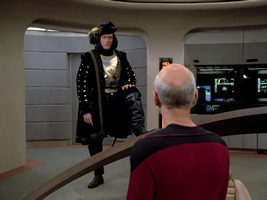
 "Encounter at Farpoint"
"Encounter at Farpoint"